












Delaware County Bar Association 2024 Officers
President
Rachael L. Kemmey, Esquire
President Elect
Michael J. Davey, Esquire
Vice President
Matthew J. Bilker, Esquire
Treasurer Jennifer M. DiPillo, Esquire
Recording Secretary
Michael H. Hill, Esquire
Corresponding Secretary
Amy D. Cappelli, Esquire
Past Presidents
Patrick T. Daley, Esquire
Carrie L. Woody, Esquire
Young Lawyers Section President
Annemarie E. Ward, Esquire
Directors
Justin M. Bernstein, Esquire
Eugene A. Bonnor, Esquire
Patricia Coacher, Esquire
David S. Daniel, Esquire
Andrew J. Edelberg, Esquire
Dimitri L. Karapelou, Esquire
Edward P. Kelly, Esquire
Gina Gorbey, Esquire
Ryan R. Grace, Esquire
Salvatore Guerriero, Esquire
Sandra M. Urban, Esquire
Walter J. Weinrich, Esquire
Staff
Executive Director
Rachel Prince
Deputy Director and CLE Coordinator
Nancy Ravert Ward
Legal Journal
Jacqueline Csop
Accounting
Debby Sulek
Communications Specialist
Nicole D’Alonzo
Delaware County Bar Association
335 West Front Street, Media, PA 19063 (p) 610-566-6625 (f) 610-566-7952 www.delcobar.org
or other
or recommendations for any individuals. The placement of paid advertising does not imply
by the
All rights reserved. No portion of this publication may be reproduced electronically or in print without the express written permission of the publisher or editor.
COVER:
The 1724 Chester Courthouse proudly celebrates its 300th anniversary in 2024! Story on page 22.
If you would like to provide editorial content for future issues of en banc please forward your story ideas to Nicole D’Alonzo, Communications Specialist & Editor – nicole@delcobar.com Article content consideration will be given to DCBA members, sponsors and partners first, but we welcome content suggestions from the Delaware County community as well. All content placement is solely at the discretion of the Association.

Welcome to the new and improved Delaware County Bar Association bi-annual magazine!
We held a contest earlier this year to allow one of our members the opportunity to lead the refreshed publication with a new masthead. Our members put it to a vote and chose the title “The Delco Side Bar” submitted by Lorraine Ramunno, Esquire.
“But that’s not the name of the magazine I’m holding,” the reader might proclaim. Very observant, dear reader! While the initial excitement surrounded this catchy name, we encountered a minor hiccup. Much to our chagrin, we soon discovered “Side Bar” was also the title of a neighboring bar association’s magazine. In the spirit of collegiality and to prevent any confusion, we decided to pivot to the equally popular runner-up title, “en banc,” submitted by Andrew Edelberg, Esquire, which came in only a vote shy of first place.
We are thankful to all who participated. To learn a little more about both of our winners, check out their “Initial Consult” features on page 6.
Our next issue will come out in winter and promises to be equally engaging. We invite all members to contribute articles, propose interviews, suggest topics, or submit column ideas for consideration. Please direct your submissions to me at nicole@delcobar.com.
Thank you kindly,
Nicole D’Alonzo Communications Specialist Delaware County Bar Association
AUGUST 19 - 23 SEPTEMBER 10 SEPTEMBER 19

Dear Esteemed Members of the Delaware County Bar Association,
William Arthur Ward once stated, “The pessimist complains about the wind; the optimist expects it to change; the realist adjusts the sails.”
You, the members, DCBA staff, Board, and our esteemed President, are the custodians of our association’s legacy, and we are currently faced with the challenge of modernizing and upkeeping our physical infrastructure and reevaluating longstanding traditions to better serve the needs of our members and community. It is natural for us to have differing perspectives on how to approach these changes. Some may feel hesitant about departing from tradition, while others may be eager to embrace new possibilities.
However, it is the realist who recognizes the need to adapt to our evolving environment. Instead of clinging to the comfort of familiarity, the realist acknowledges the necessity of adjusting our sails to navigate the winds of change. They understand that progress often requires us to challenge the status quo and innovate in response to shifting realities.
As members of the Delaware County Bar Association, we must embody the spirit of realism in our approach to revitalizing our physical space and reimagining our traditions. We must also understand that our association’s building and customs, while steeped in history, must also reflect the contemporary needs and aspirations of our members.
It is an incredible time to embrace this opportunity for transformation—to envision a future where our physical space is not just a monument to the past, but a dynamic hub for collaboration, learning, and innovation. By modernizing the building and reevaluating our traditions, we not only honor our legacy but also ensure the continued relevance and vitality of our association for generations to come.
As we embark on this journey of renewal, let us remember the wisdom of Ward’s words and embrace the spirit of realism in all that we do. Together, let us adjust our sails, harnessing the winds of change to propel us toward a brighter future for the Delaware County Bar Association and the legal profession as a whole.
Sincerely,
Rachael L. Kemmey, Esq.
Rachel Prince
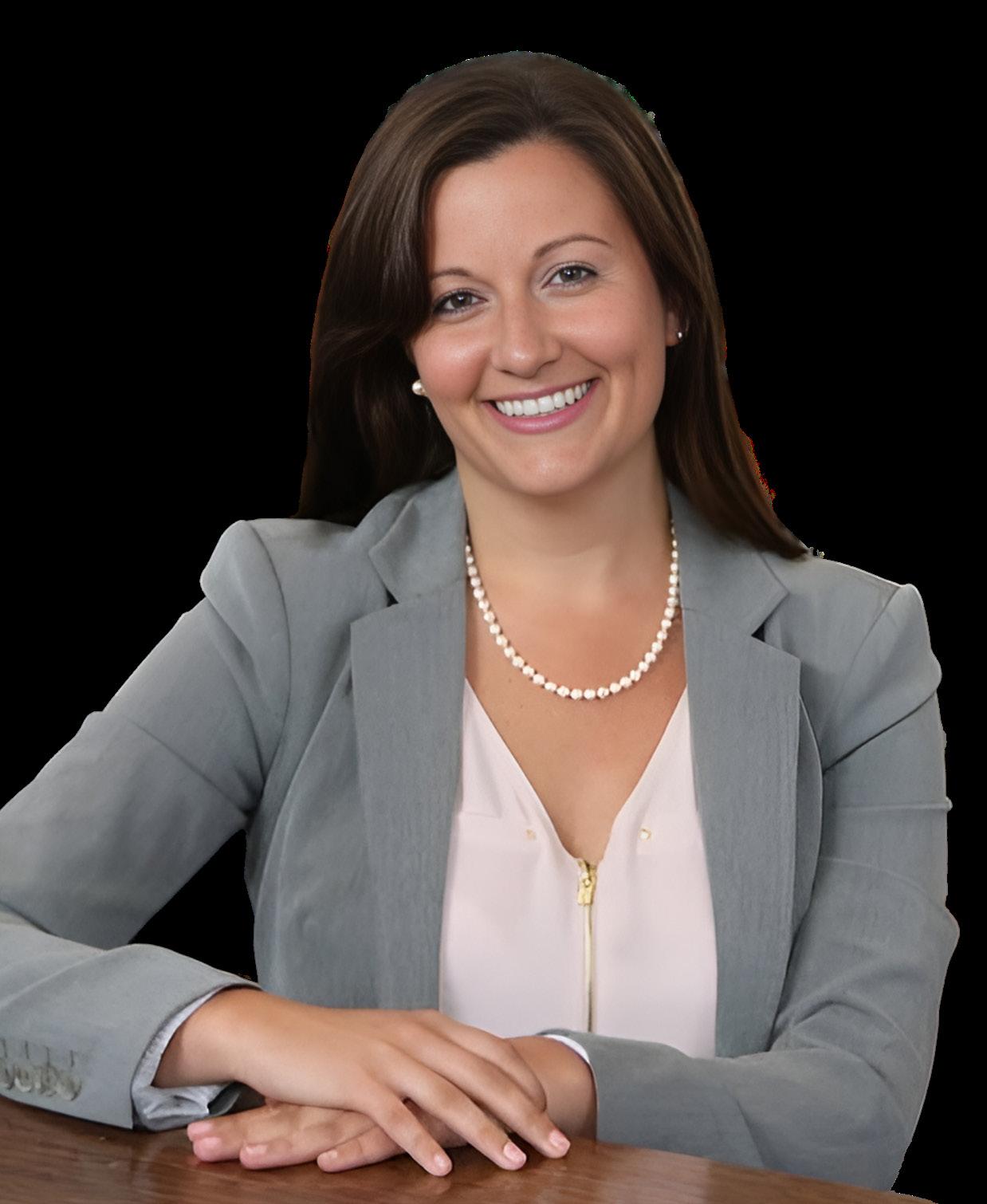
Six months ago, I assumed the Presidency of our beloved Association. This honor fulfills a professional dream of mine, a dream that formed the day I attended my first Young Lawyer’s Section meeting almost eleven years ago. It is certainly not lost on me what a profound privilege and responsibility it is to lead our 1,200 members, following in the footsteps of the brilliant legal minds that have also served in this role; individuals whom I consider both mentors and friends.
Unfortunately, at the start of this year, my family suffered an immeasurable loss when my dad passed away, following a hard-fought battle with cancer, two days after the President’s Dinner. I honestly did not think I was capable of serving in this role after that, but, the outpouring of support from both the membership and the staff was truly touching, and I would be remiss not to express my sincerest gratitude for that. The added care that we have for each other in our personal, and not just professional, lives, makes this Association different than the rest.
I was not expecting my first task to involve putting on a hardhat and overseeing emergency construction on the building, that’s for sure! But, like most of life, plans change and that was the first task requiring immediate attention. I am proud to say that, in the face of challenge, the Board of Directors and our Executive Director exemplified
resilience, unity, and unwavering dedication to overcoming the obstacle put before us. Together, the Board rose to the occasion, acting in an expedient manner and demonstrating steadfast leadership which protected the structural integrity of our building, not just as an immediate fix, but for years to come. If you haven’t already, stop down and check out our new blue wall! I am also proud to say that the Board of Directors has collectively decided to commit their time and energy to making sure that we uphold our promise of community involvement and will be participating in several new charity events this year.
Just like the building, our ability to exist as an organization in the future depends upon membership being open to upgrades as well. In navigating the passage of time, there’s a delicate balance between embracing change and preserving tradition. While our Association is rich in tradition – traditions that we certainly hold dear – our survival for future generations requires our membership to embrace change and to invite the implementation of new ideas with excitement and an open mind. By melding the old with the new, we will give our Association the best chance of continued success. Another way we can ensure our legacy is by increasing membership, and not simply the quantity of membership but also fostering quality membership. Recruitment is not merely about expanding numbers; it’s about infusing vitality, diversity, and fresh perspectives. Contrary to popular belief, this does not always mean seeking out the “new” members in our legal community. There are plenty of lawyers who have been practicing law in our County for years, and, for one reason or another, they have either never joined or their participation level has dwindled. I encourage every single one of our members to reach out to someone you know who falls into either of these two categories. Reach out and tell them about your experiences as a member and the invaluable benefits that membership provides. Something as simple as inviting a prospective member to a social event or pointing them in the direction of a committee they may find interesting, might be the push someone needs to begin their involvement, or, to reinvigorate their membership.
Over the next six months, I will strive to continue serving our members. We have many new and exciting programs in the works that I cannot wait to see come to fruition!
Rachael L. Kemmey, Esquire, President
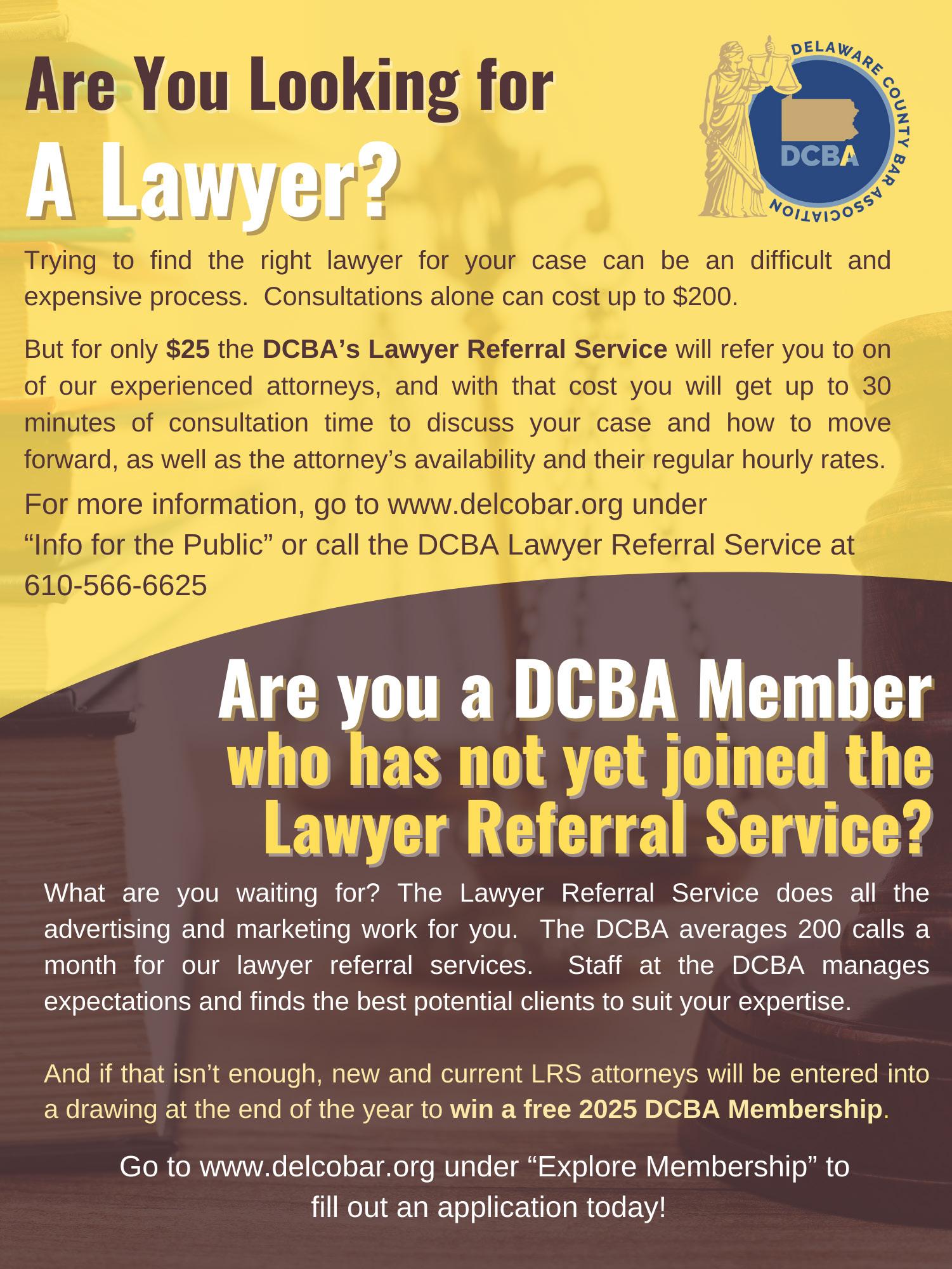
Lorraine Rammuno, Esquire
(Initial Winner of Magazine Renaming Contest*)

What is your favorite hobby outside of work?
My favorite hobby outside of work is painting furniture. I have painted two pieces and have many projects lined up – but very little time to do them.
If you could live in any time period, which one would you choose and why?
If I could live in any time period, it would be in the 1950s and 1960s. It was
a simpler time with less stress, more family involvement, and more respect.
If you were given a year off with pay, what would you do with that time?
I would clean, declutter, and organize my house and downsize my life. I would also focus on getting fit. Over the past 28 years since my oldest child was born in 1996, I have accumulated so much stuff. This is a job that really needs to get done so that I can move on to a more organized, simpler lifestyle.
Have you ever had a funny or awkward encounter with a celebrity or public figure?
One year, on Thanksgiving eve, I ran
into Wanda Sykes in the Trader Joe’s in Media. I usually start at the first aisle, but it was too crowded, so I went to the last aisle where the dairy is located. As we passed each other, I was surprised and enthusiastically said, “Hi!” and she responded the same way.
If you were to pursue a different career path outside of law, what would it be?
If I pursued a different career path outside of law, I would choose to be a marine biologist. I am fascinated with sea life and love to be near the water.
*Refer to page 2 for explanation of magazine renaming.

Andrew Edelberg, Esquire
(Default Winner of Magazine Renaming Contest)
What is the best piece of advice you’ve ever received?
Do not ever be afraid to ever ask anyone for guidance, help, or for letters of recommendation.
What is the most memorable concert or live performance you’ve ever attended?
The most memorable concert for me was Bruce Springsteen around 1988 or so – the Born in the USA Tour in Philadelphia at Veterans stadium. My best friend, who I’d known since I was 12, scored the tickets. He passed away a few months ago, so that concert will always be treasured.
If you could have a conversation with any famous person, living or deceased, who would it be and what would you ask them?
I would enjoy the opportunity to speak with Joe Pistone, Former Special Agent of the FBI, and first ever and only undercover agent to be offered sponsorship in the Mafia in New York. If given the chance, I would ask him about his feelings and thoughts about
how the FBI handled the arrests of the people he befriended, and what his greatest and most inspiring moment was as an FBI Agent.
I have been close to the Philadelphia FBI office for the last 10 years and have been blessed with the opportunity to volunteer with them during this time. I’ve also worked with and been honored by the D.E.A.
What is one book or movie that has greatly influenced your life and why? It’s hard to pick just one movie, but here are my top inspirational movies. They all involve law and the symbolism of right versus wrong and good triumphing over evil.
1. The Untouchables is classic Elliot Ness and the Treasury Department versus Al Capone.
2. Night Falls on Manhattan is about a cop who becomes the District Attorney prosecuting his first drug case and later determines the case may have been illegal and chooses to prosecute corrupt police.
3. The Verdict is perhaps Paul Newman’s finest film as he plays a washed-up injury lawyer who goes up against a big defense firm in a medical
malpractice case. He delivers a moving closing argument which can still be used to this day and comes away with a huge verdict.
4. Donnie Brasco is the true story of Joe Pistone going undercover to infiltrate the Bonanno crime family in NYC.
5. Lastly, The Cowboys, which is not a movie about law, I just love John Wayne. In this movie the Duke plays a rancher about to do a big cattle drive when his whole team leaves to join the gold rush, leaving him to train a group of schoolboys.
What is your favorite hobby outside of work?
Movies. Theater. Music of all kinds especially the blues and BB KING.
I love all kinds of music especially Eric Clapton, BB King, Jeff Bonamassa, and the Blues. I also am a fan of the deceased and amazing blind guitarist Jeff Healey. The blues tell classic stories of soul, inspiration, and movement. I love country music and am a huge Tim McGraw and Rascal Flatts fan. I have autographed pictures of Tim McGraw and Rascal Flatts in my office. Their music meant a lot when my mother was diagnosed with and suffered from cancer for 12 years until she passed.
As you can tell, I’m an extremely sentimental guy who wears his heart on his sleeve and I have a deeply giving heart with a strong moral compass. I believe respect is earned not given no matter who you are. And that you should strive for excellence. I also believe as a trial lawyer that we are a different breed than just being a lawyer. We help injured and criminally charged clients solve their problems, get compensation to help them and their families, and help people in trouble.



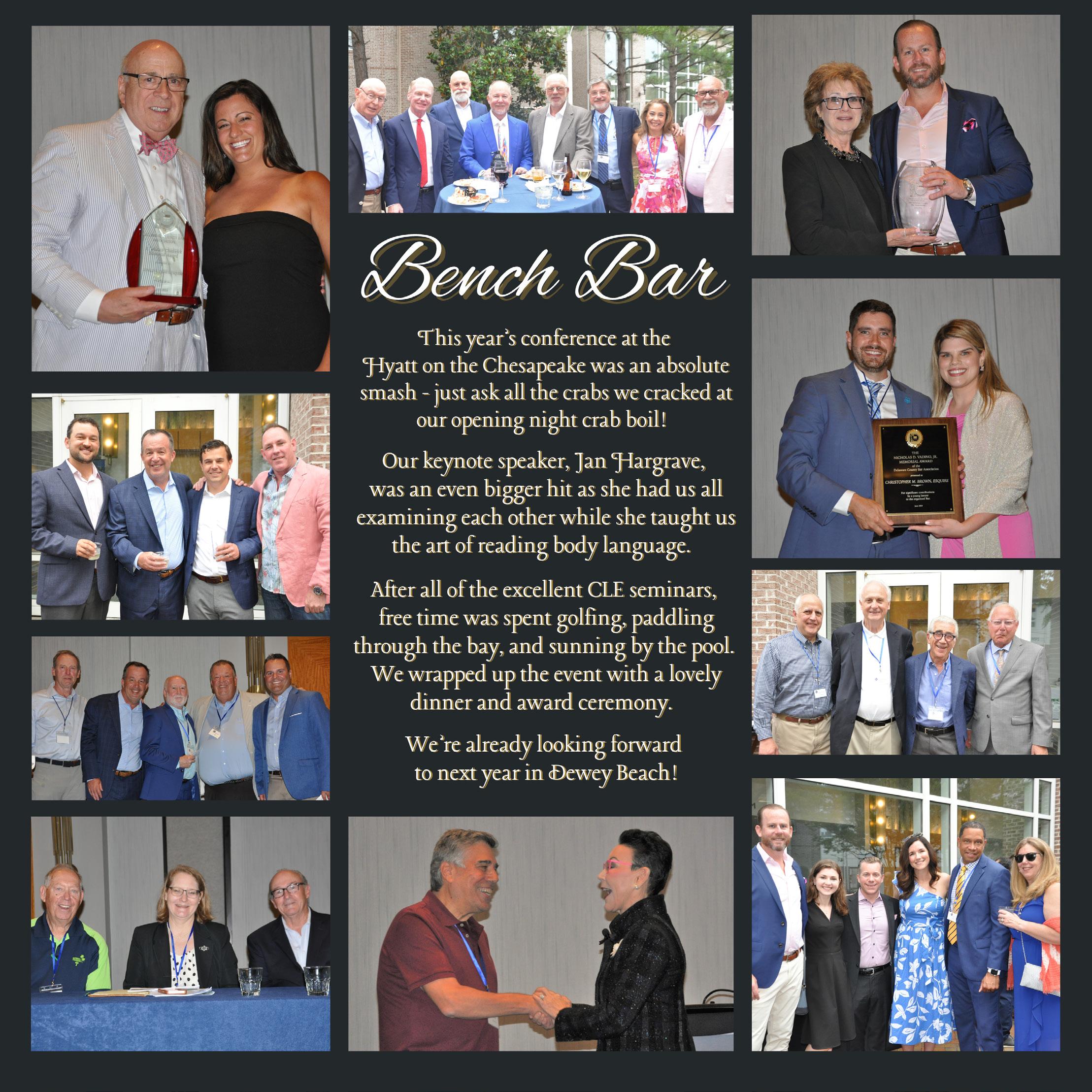
In today’s bustling world, where big-box corporations dominate the market, it’s easy to overlook the value of local businesses. Yet, there’s something irreplaceable about the personal touch, reliability, and commitment to community that local, family-owned and operated businesses like Karasch & Associates give you. As a women-owned business deeply rooted in the fabric of our community, we take pride in offering exceptional court reporting and legal support services across Pennsylvania, New Jersey and Delaware.
We understand the unique needs of our clients because we’re locals too. Having served Delaware County and all of Greater Philadelphia for 44 years, our team of certified court reporters delivers accurate and reliable transcripts with precision and professionalism. Whether you require court reporting services for a deposition, arbitration, or trial, we’re here to ensure your legal proceedings run seamlessly.
But we offer you more than just court reporting. Our comprehensive suite of legal support services includes videography to capture every crucial moment, ensuring nothing is
missed. We specialize in transcription of audio and video files, as well as translations and interpreting for legal documentation and proceedings in a multitude of languages. In addition, we’re committed to staying ahead of the curve with cuttingedge eDiscovery and Document Review solutions, empowering legal professionals with the tools they need to navigate complex cases efficiently.
Choosing Karasch isn’t just about getting quality service; it’s about investing in your community. As a local, family-owned and operated business, we’re deeply ingrained in the communities we serve. When you partner with us, you’re supporting local jobs, local families, and the local economy. We live where you live, shop where you shop, and contribute to the vibrant tapestry of our neighborhoods.
But our commitment to community goes beyond economic impact. At Karasch & Associates, we believe in giving back. That’s why we’re actively involved in local initiatives and charities, supporting causes that matter most to our neighbors. We also actively donate to local Bar, Paralegal and ALA Associations. When you choose us,

you’re not just choosing a service provider; you’re choosing a partner who shares your values and invests in the well-being of our community.
Trust and reliability aren’t just buzzwords to us; they’re the cornerstones of our business philosophy. We understand the importance of building lasting relationships based on mutual respect and trust. That’s why our clients return to us time and time again, knowing they can rely on us to deliver exceptional service with integrity and professionalism.
In a world where impersonal interactions and corporate giants reign supreme, Karasch & Associates stands out as a beacon of personalized service and community commitment.
So, the next time you’re in need of court reporting services, transcription, language translation, videography, or cutting-edge eDiscovery solutions, remember the difference that choosing a local, family-owned and operated business can make. Choose Karasch & Associates and experience the difference firsthand. Together, we can build a stronger, more vibrant community—one deposition at a time.
Large premium increases aren’t news for law firms or other businesses of any size. They are, however, a big concern. But that doesn’t mean area firms have to take those increases lying down. Sometimes all you need is the right benefits partner – My Benefit Advisor (MBA).


A Delaware County LPL insured firm with no group benefits got hit with a 23% ($70K) premium increase from their medical carrier. The 35-40 employee firm simultaneously lost their Benefits Administrator, leaving an unhappy Controller to handle benefits and an unacceptable hit to their benefits budget.
Without the benefits experience they needed, the firm reached out to My Benefit Advisor, a benefits broker known for their expertise across the spectrum of employee benefits and strong connections with the Delaware Valley’s established carriers.
MBA took on a variety of concerns for this Delco firm, negotiating an 11% decrease from their existing carrier. However, MBA would ultimately find a new carrier for their new client at a 20% lower premium (saving the firm $90K in yearly premium) and a comparable benefits package. MBA added a bar association discount with the carrier to save the client another $4,500 in premium.
But the departed Benefits Administrator left the firm with other problems. MBA representatives talked to their client about its in-house benefits management capabilities and leading-edge technology. The client was sufficiently impressed and implemented MBA’s Employee Navigator tech to handle benefit enrollment, integrate benefit deductions with payroll, and eliminate paper for Q1/Q2 of 2024.
MBA works with Delaware County Bar Association members seeking benefits expertise, cost containment solutions, carrier negotiation skills, strategic consultation and more. Many DCBA members also utilize My Benefit Advisor’s benefits planning, management, and service center to handle their employee benefits program from top to bottom, eliminating unnecessary employee overhead.
If your firm is struggling with rising health benefit costs
and quality, benefits management, or HR limitations, or if you just want to discuss the possibilities – MBA brings proven solutions, extraordinary expertise, technology, and carrier connections for businesses of all sizes to Delaware, Chester, Montgomery, Bucks, Berks, Lancaster, Philadelphia counties and beyond. To learn more about how MBA can help your firm, visit our website at dcba.mybenefitadvisor.com or contact Marlon Richardson at 215-790-3640.

• Nicholas Altopiedi, Esquire, of Alfred V. Altopiedi, PC
• Mary Elizabeth Clay, Esquire, of the Delaware County District Attorney’s Office
• Joanne Curley, Esquire, of CSE Institute
• Eugene J. Gibbons, Esquire, of Law Office of Mark P. Much, PC
• Hon. Benjamin F. Johns Magisterial District Judge
• Michelle Elizabeth Kearsley of Anthony J. Bilotti & Associates
• Joseph Kernen, Esquire, of DLA Piper (ret.)
• John C. Meehan, Esquire, of the Delaware County District Attorney’s Office
• D. Addison Murray, Esquire, of Russell Law PC
• Mariette J. Mooyman, Esquire,
• Jeremy N. Rhoads, Esquire, of Aivazoglou & Mikropoulos
• Chelsea C. Stine, Esquire, of Chelsea C Stine, Esq. LLC
• Erika Becker, Esquire, of Legal Aid of Southeastern PA
• Roger P. Cameron, Esquire, of Cameron Law Firm LLC
• Barak Kassutto, Esquire, of Morgan & Akins, PLLC
• Kyle H. Miller, Esquire, of Kilkenny Law LLC
• Deirdre M. Richards, Esquire, of Elliott Greenleaf, PC
• Miska Shaw, Esquire, of Ahmad Zaffarese LLC
• Carl Witkin, Esquire, of Crane & Witkin
• Daniel J. Yarnall, Esquire, of Unruh Turner Burke & Frees
• Shelby Dolch
• Walter Jones, Jr.
• Megan McCarthy-White
• Marisa Rauscher
• Jake Shane
• Ethan Smith
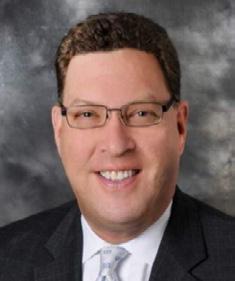
FRANK G. MURPHY, ESQUIRE
May 8, 1962 –January 31, 2024
Frank served as Assistant Solicitor for Delaware County, Solicitor for the City of Chester Parking Authority and outside counsel for the City of Chester and several other municipalities.
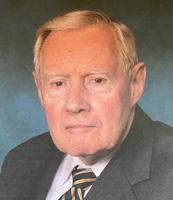
DAVID HENNESSY, JR., ESQUIRE
1925 - April 13, 2024
Dave had a lifelong commitment to helping others through his pro-bono legal work, the Rotary Club, and as a member of the Delaware County Community Nursing Service board.
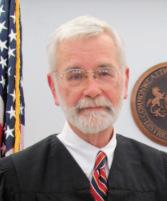
HONORABLE
NICHOLAS S. LIPPINCOTT
November 9, 1948 – April 13, 2024
Judge Lippincott served as a magisterial district judge in Upper Providence and Rose Valley for 18 years, presiding over thousands of criminal, civil, and domestic cases with a keen legal mind and compassion for those who came before him, always attempting to improve people’s lives. He retired in 2018 and served as a senior judge in Delaware and Perry counties. Judge Lippincott also served as an Upper Providence Township commissioner. He was dedicated to public service.

DAVID J. OTIS, ESQUIRE
1946 - May 7, 2024
David worked as an attorney in Delaware and Montgomery Counties for 42 years until he retired in 2014 to spend more time with his grandchildren.
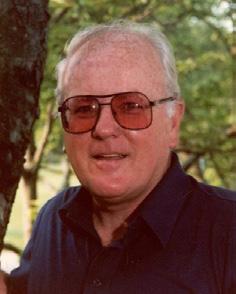
JAMES C. BRENNAN, ESQUIRE
August 22, 1933 – June 1, 2024
Both an attorney and active DCBA member for 63 years, James was the recipient of our E. Wallace Chadwick Memorial Award in 2020 as recognition of his services to the legal profession in furtherance of intraprofessional development, communication and education.

KENNETH D. POWELL, JR., ESQUIRE
1960 – June 20, 2024
Ken practiced law for 40 years and was a member of the DCBA since 2002. He most recently practiced at Weber Gallagher and focused his practice on medical malpractice, healthcare law and general liability.


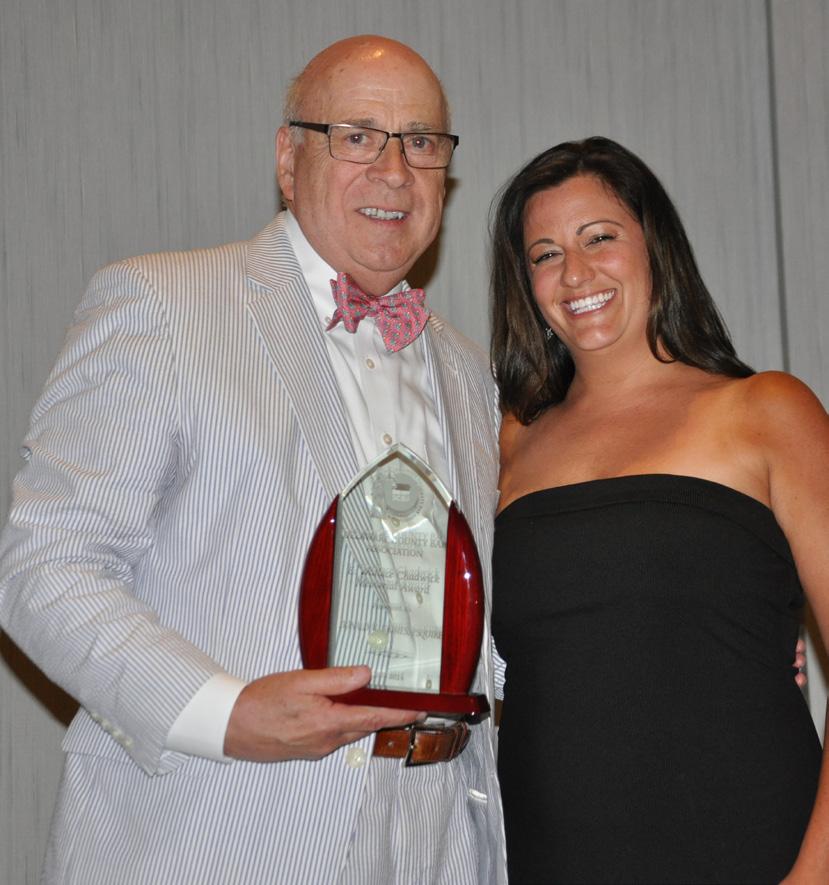
E. Wallace Chadwick Memorial Award –Donald M. Grimes, Esquire
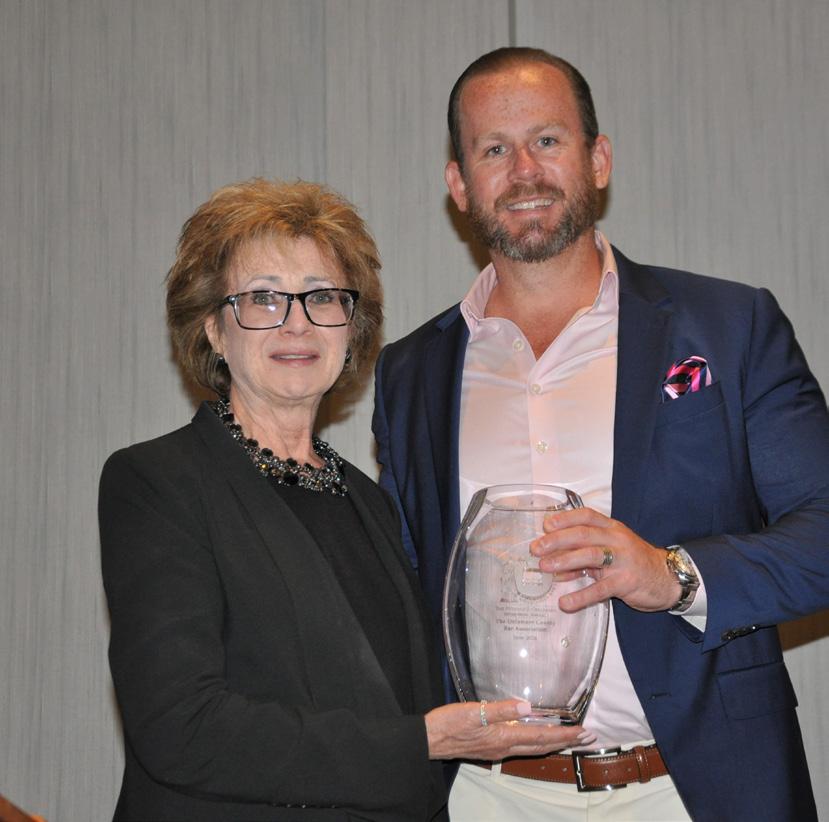
Donald J. Orlowsky Memorial Award –accepted by Past President Patrick T. Daley, Esquire
President’s Dinner Award Winners
• President’s Special Recognition Award – Annemarie E. Ward, Esquire
• Paul R. Sand Award – Robert M. Firkser, Esquire
• Eckell Sparks Illumination Scholarship – Richard A. J. Prebil, Esquire
Law Day Award Winners
• Themis Award – Jean Arnold [showcase & photo]
• Liberty Bell Award – Bikers Against Child Abuse (B.A.C.A.) Elizabeth C. Price – Eugene J. Malady, Esquire
Bench Bar Conference
• Nicholas Vadino Award – Christopher M. Brown, Esquire
• E. Wallace Chadwick Memorial Award – Donald M. Grimes, Esquire
• Honorable Frank T. Hazel Hall of Fame Award - Gail M. Whitaker, Esquire
• Donald J. Orlowsky Memorial Award – Delaware County Bar Association (for their efforts with the 2023 judicial retention) accepted by Past President Patrick T. Daley, Esquire
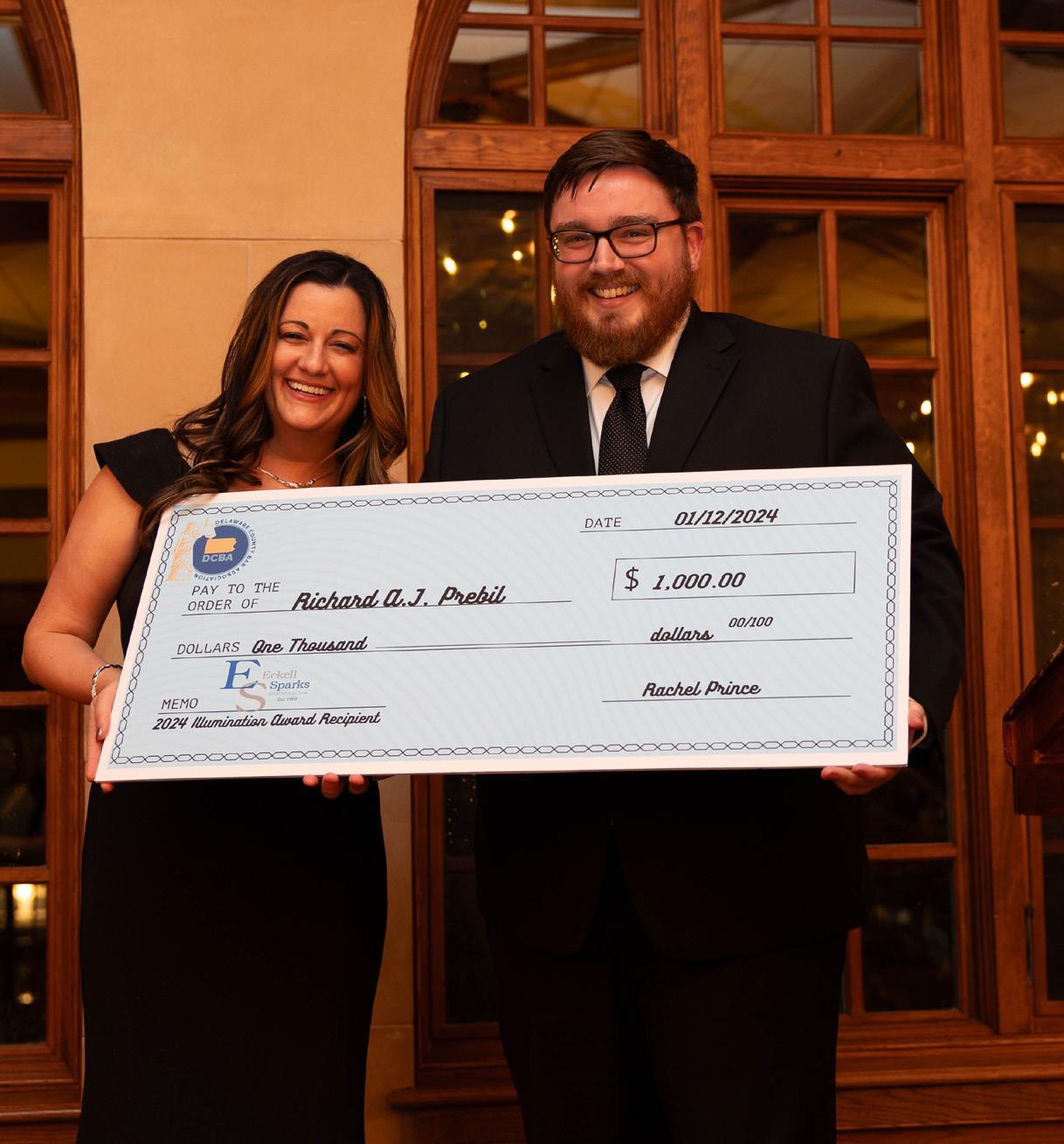
Eckell Sparks Illumination Scholarship –Richard A. J. Prebil, Esquire
By David Robbins, Esquire
Every now and again, we come upon individuals whose passion and commitment to a personal cause seems to define them. Their commitment is without bottom, infinite. Their dedication, evident in their actions. They are always busy, yet they never refuse additional obligations to further the causes to which they are devoted. The 2024 Themis Award winner, the DCBA’s award to a non-lawyer whose actions promote an understanding of legal processes and foster respect for the law, is annually presented to such an individual.
The Themis award winner has an undergraduate degree in Biology and a master’s in business. She has worked at Fortune 500 companies and moved to Delaware County due to employment with the former Scott Paper Company, now Kimberly-Clark. That connection with the paper-making facility in Chester led her to an abiding commitment to Chester’s children. She has, for a number of years, been involved in the NAACP’s Frederick Douglass Oratory contest which promotes not only speaking skills, but an understanding of Douglass’ considerable contributions as a social reformer, particularly to our Nation’s antislavery movement. She has also been integrally involved in motivating
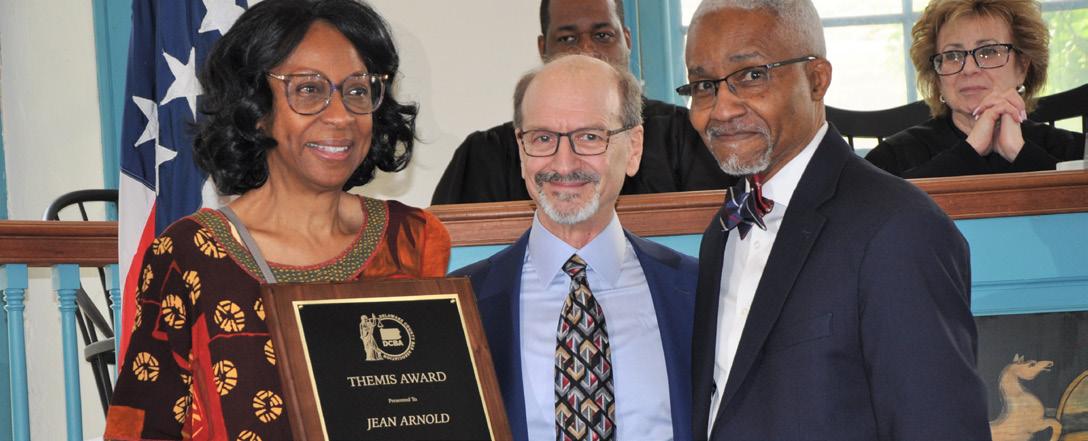
students, training them for writing and delivering speeches at the annual Chester Law Day Program and providing basic life-skills advice. The fruits of her efforts this year are fully ripened, and seven children will be presenting at the 2PM Law Day celebration at the 1724 Chester Courthouse later today.
She frequents both the Chester Upland School District’s school board meetings as well as Receiver’s proceedings and champions the interests of students in both subtle and vigorous ways. She has been a studious follower of the litigation that culminated in a Commonwealth Court decision which found that Pennsylvania’s children deserve and must receive a proper quality education in public schools.
Undoubtedly, she is now shifting uncomfortably someplace in this room because she shuns the limelight and prefers to labor effectively without notice or fanfare. Well, A. Jean Arnold, we will minimize your current distress and ask you to come forward so we can, as you would likely say, “Get to other, more important, matters.” Jean Arnold, would you please come forward and receive the highest honor the Delaware County Bar Association awards to a non-lawyer?

The annual Liberty Bell Award, presented by the Young Lawyers Section of the Delaware County Bar Association, celebrates individuals outside the legal profession who exemplify outstanding community service and promote the principles of liberty enshrined in the constitution. This year, the esteemed accolade was bestowed upon Bikers Against Child Abuse (BACA) for their unwavering commitment to protecting and empowering abused children.
BACA’s mission, “No child should live in fear,” underscores their dedication to creating a safer environment for vulnerable children and providing them with the support they need to overcome their trauma. Operating in partnership with local and state authorities, BACA assists abused children and their families by ensuring their safety, accompanying them to court proceedings, and advocating for their rights.
The Delaware County chapter of BACA, which is the National Mother Chapter, exemplifies the organization’s ethos of solidarity and familial support. Every member of the chapter, represented by road names such as “Phoenix” and “Gypsy,” plays a vital role in the collective effort to protect children from abuse. Their selfless dedication to the cause was

exemplified when they declined individual recognition for the Liberty Bell Award, opting instead to share the honor among all members on a rotational basis.
In addition to their core mission, BACA Delco organizes community events such as Bike Nights and a yearly Toy Run for Christmas, which not only raise awareness but also generate essential resources to further their mission.
Bikers Against Child Abuse represents the epitome of compassionate activism, embodying the principles of individualism, courage, and altruism in service of a free and just society. Their recognition with the Liberty Bell Award is a testament to the profound impact they have on the lives of abused children and their families, inspiring hope and resilience in the face of adversity.
The road names of BACA Delco’s 19 members are as follows: Patches, Derf, Twisted Sister, Firecracker, Gypsy, Pillows, Buzz, Phoenix, Peanut, Cook, Staples, Wardrobe, Southpaw, Lambchop, Slap Happy, Doc, Suga T, Gigi, and Maniac Mel.
If you or someone you know may be in need of BACA’s services, you can reach BACA Delco’s contact person, Fred Pearson (aka Derf) at 484-832-5813.


By Brian S. Quinn, Esquire
“What am I doing here? I don’t belong.”
“I’m a total fraud and, sooner or later, everyone’s going to find out.”
Sound familiar? If you have ever found yourself saying (quietly) those words, then you may be among the many people who are dealing with Imposter Syndrome.
Imposter syndrome, also called perceived fraudulence, involves feelings of self-doubt and personal incompetence that persist despite your education, experience, and accomplishments. While early studies focused on highly successful women, it is now clear that it can affect anyone in the legal profession – from law students to Big Law executives.
Living in constant fear of discovery, you strive for perfection in everything you do. You might feel guilty or worthless when you can’t achieve it, not to mention burned out and overwhelmed by your continued efforts. The results can be devastating.
True imposter feelings involve self-doubt and uncertainty about your talents and abilities. But what if you find yourself in an environment where your peers fail to make room for you or imply you don’t deserve your success? Along with the more traditional factors, gender bias and institutionalized racism can also play a significant part in imposter feelings. Even if only perceived, they can surely reinforce the feeling you don’t belong.
First described by psychologists Suzanne Imes, PhD, and Pauline Rose Clance, PhD, in 1978, who referred to it as impostor “phenomenon,” as something which occurs among high achievers who are unable to internalize and accept their success. They often attribute their accomplishments to luck rather than to ability, and fear that others will eventually unmask them as a fraud.
Despite what may be overwhelming evidence of their deserved accomplishments, people who suffer with imposter syndrome remain convinced that they were “lucky” and that their luck will eventually run out and leave them humiliated among their “real-deal” colleagues.
So what do Michele Obama, Lady Gaga, Tom Hanks, Justice Sonya Sotomayor, Serena Williams and Starbucks CEO Howard Schultz have in common? As you may have guessed based upon today’s topic, they are among the many wellknown and highly successful people who have suffered from imposter syndrome.
Hard to believe, you say? Well according to a 2011 article in the International Journal of Behavioral Science, an estimated 70 percent of the population will experience at least one episode of impostor syndrome in their lifetimes. I like to point that out to lawyers and law firms, where there still seems to be a pervasive disconnect. While many individual lawyers (including some senior in the profession) are willing to describe their impostor syndrome and how it negatively impacts them and their enjoyment of their work and lives, many law firms as organizations deny that their lawyers struggle with this issue, definitively stating, “Look, we don’t have that problem!”
constant deadlines set by the courts, other parties, clients, and their senior colleagues over which they have very little control.
Lawyers are served well—at least professionally—by their perfectionism. But this same perfectionism can make them feel like their work is never good enough. This sort of perfectionism is a major risk factor for burnout.
Do you feel like your work must be 100% perfect, 100% of the time? Truth is, there will never be the “perfect time” and your work will never be 100% flawless. The sooner you’re able to accept that, the better off you’ll be. Not all perfectionism is inherently bad. Experts refer to it as adaptive perfectionism.
Adaptive perfectionism is healthy and normal and relates to an intense effort that is put forth to achieve a certain goal. Adaptively perfectionistic individuals set high, but realistic standards, and don’t resort to harsh self-criticism when these standards are not reached. The goal is not to slip into that “other” form of perfectionism that is maladaptive and can stand in the way of leading a happy and successful life.

Lawyers are served well—at least professionally—by their perfectionism. But this same perfectionism can make them feel like their work is never good enough. This sort of perfectionism is a major risk factor for burnout.
When the out-of-control perfectionist fails to reach a goal, they experience major self-doubt and worry about measuring up. Whether they realize it or not, this group can also be control freaks, feeling like if they want something done right, they have to do it themselves. These so-called impostors think every task they tackle has to be done perfectly, and they rarely ask for help. That perfectionism can lead to two typical responses: They may procrastinate, putting off an assignment out of fear that he or she won’t be able to complete it to the necessary high standards. Or, he or she may overprepare, spending much more time on a task than is necessary.
My experience says otherwise. I believe there are certain aspects of lawyering and legal training that exacerbate the problem among lawyers. The profession is synonymous with exceptional expectations, intolerance of mistakes and risk avoidance. Impostor syndrome is common in overachievers and perfectionists, so it’s no wonder many lawyers suffer from chronic self-doubt and feel like intellectual frauds.
Some believe it is a disease of the legal profession. Lawyers tend to be perfectionists, setting impossible-to-meet standards for themselves and the sense that nothing is ever good enough. Lawyers are also trained to be on the constant lookout for problems and to be responsible for taking care of clients. This inherent pessimism over what might go wrong creates a sense that problems are everywhere, the true urgency of which becomes exaggerated. Lawyers also often fail to seek out help when needed, not wanting to appear weak. They also face
I don’t want to leave you with the idea that imposter syndrome is only about perfectionism. Far from it. Perhaps the next time I share on this blog, I will look at the problem from the social context and how a law firm environment can actually increase the likelihood of developing imposter feelings among its professionals.
We will look closely at that environment and consider the quality of treatment people receive from others—particularly the types of treatment that communicates a sense of value, worth, and fitness. Individuals may very well feel like impostors when they are treated in ways to suggest they are. Similarly, such impostor feelings can also be mitigated, when these individuals are treated by others as a person of value and worth.
Let me leave you with a handful of tips for dealing with imposter feelings.
1. Break the Silence
Shame keeps a lot of people from “fessing up” about their fraudulent feelings. Knowing there’s a name for these feelings and that you are not alone can be tremendously freeing.
Share your Feelings
Talk to other people about how you are feeling. Irrational beliefs tend to fester when they are hidden and not talked about.
3. Separate Feelings from Fact
There are times you’ll feel stupid. It happens to everyone from time to time. You’re a Lawyer, right? Look at the evidence. Think of the clients you’ve delighted. The case you won or the deal you closed.
4. Accentuate the Positive
The good news is being a
perfectionist means you care deeply about the quality of your work. The key is to continue to strive for excellence when it matters most, but don’t persevere over routine tasks and forgive yourself when the inevitable mistake happens.
5. Use Social Media Moderately
We know that the overuse of social media may be related to feelings of inferiority. If you try to portray an image on social media that doesn’t match who you really are or that is impossible to achieve, it will only make your feelings of being a fraud worse.
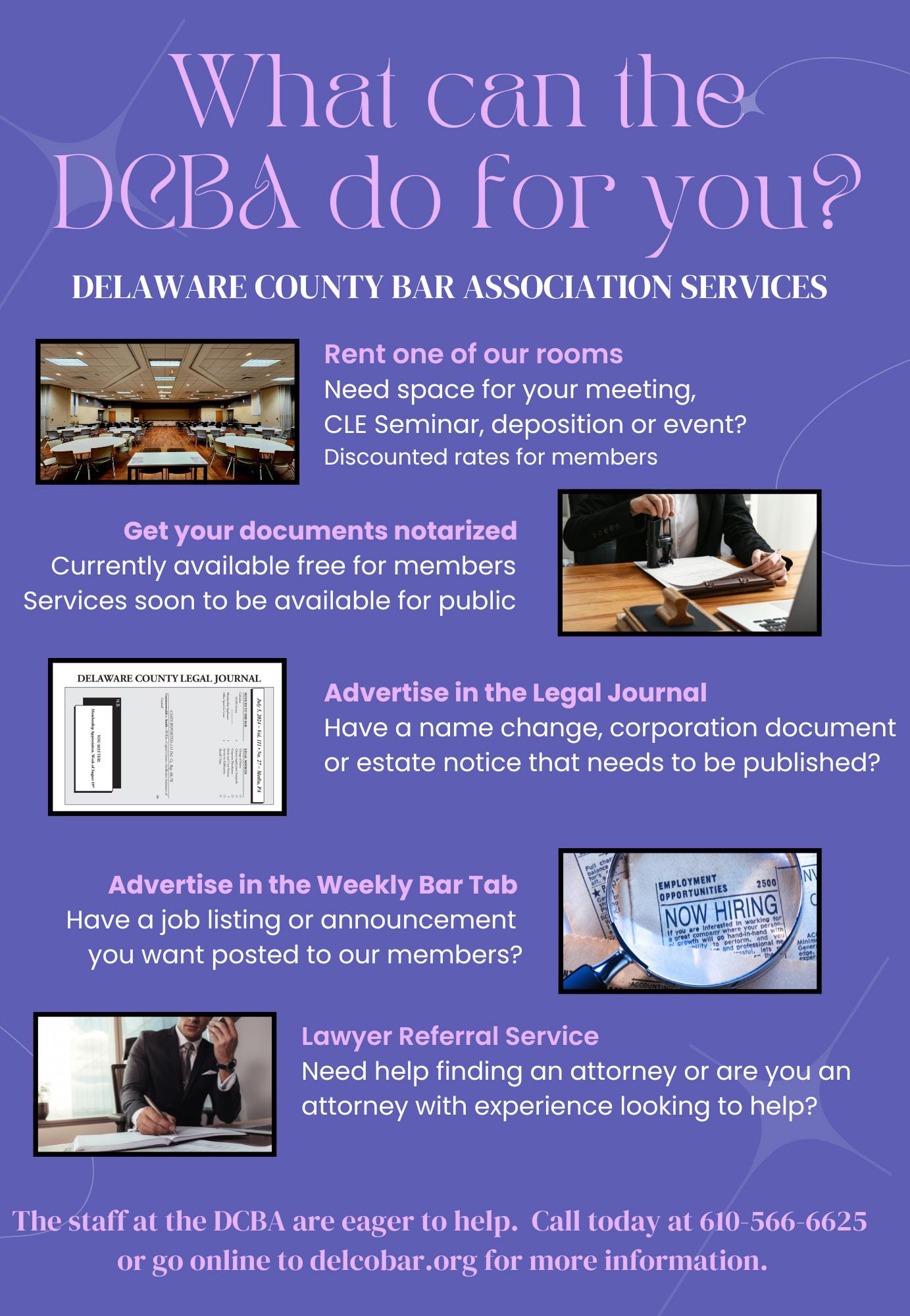
6. Develop a Healthy Response to Failure and Mistakes
Instead of beating yourself up for a shortcoming, say “Wait ’til next time!”
7. Fake it Until You Make It
Now and then we all have to fly by the seat of our pants. Tell yourself you are confident and you are smart. By telling yourself you have these qualities and acting as if you are, soon you won’t be telling yourself or acting anymore.
Everyone has unique abilities. You are where you are because someone recognized your talents and your potential. You may not excel in every task you attempt, but you don’t have to, either.
Avoid Comparing Yourself to Others
Everyone has unique abilities. You are where you are because someone recognized your talents and your potential. You may not excel in every task you attempt, but you don’t have to, either. Almost no one can “do it all.” Even when it seems like someone has everything under control, you may not know the full story. Trust me, no one would ever guess what I experienced and where it all took me. Why? Because I finally admitted that I needed help, and it changed my life forever. I am living proof of the incredible work of lawyers assistance programs that exist throughout this country and that showed me that I was not alone.
REMEMBER – Real imposters don’t suffer from Imposter Syndrome!!
Written
by Brian S. Quinn, Esquire, of the Law Offices of Brian S. Quinn, P.C. bsqesq@msn.com

It may shock you but everyone inside (and outside for that matter) should have a Private Investigator in their rolodex.
Private Investigators are nothing like those shows you see on TV like Magnum PI, Rockford Files or Moonlighting but we are crucial components of the legal system. While not every investigator does everything from soup to nuts, there are agencies that can make or break your case.
First and foremost, make sure your investigator is licensed, bonded, and insured, and check at least 8-10 references before moving forward. Furthermore, you want to check to see if the Agency specializes in something particular or does only general investigations. There are investigation agencies that just provide surveillance, some that just provide civil /family law ligation support, and others that provide criminal investigation support or accident reconstruction. No one agency honestly can do it all and do it effectively.
It’s not always about the agency’s background either. Some agencies are retired law enforcement officers (“LEOs”) and that’s how they think. They might not be aware of the rules and regulations a full-service agency is, nor do they even consider taking continuing education classes. You don’t want to have any parts of your investigation thrown out because the information provided was not secured legally or provided by a source of the retired LEO.
Keep in mind that the State of PA has no reciprocity with the states of New Jersey, Delaware, Maryland, or any other state for that matter. What does that mean to you? That means unless the agency is not licensed, they must stop at the border. Some states such as Delaware do not even allow investigators into their state without a license to do research in the courts.
If you could, find an agency that can go into more than one state. Has references or awards. A full-service agency that can provide things like witness statements, locating witnesses or lost clients, provides process serving and asset investigations, the entire soup to nuts. Some agencies can also provide notary services or paralegal services, making them truly full service.
You see, investigators, men and women alike, are not just pretty faces but useful tools in your legal arsenal.
The team at Harris Investigations, LLC is proud to be a top notch, award-winning full-service agency covering the states of PA, NJ, DE, MD, WV, MI and IN with boots on the ground. Many of our services such as skip tracing, asset searches, locating of subjects, department of motor vehicle records and so forth can be done nationwide from our offices.
Should you need our services, have any questions, or want more information, reach out to us at 888-484-9827 or email harrisinvestigations37@gmail.com.
Michele Harris-Woodrow, CEO and Sole owner of Harris Investigations, LLC
Established in 2005

A REFLECTION ON THE CHANGING NORMS IN DELCO LAW PRACTICES.
By Joseph Patrick O’Brien, Esquire

Celebrating the three-hundred-year anniversary of Delaware County’s 1724 Courthouse causes some reflection on the changing norms in Delaware County law practice over the years.
About 50 years ago William Cornell Archbold, Jr., Esq., then President of our Delaware County Bar Association (“DCBA”), led the 1972 Law Day parade in Chester, Pennsylvania down what was then called Market Street, now Avenue of the States, to the site of the original Delaware County Courthouse built in 1724. It was a glorious day not only for the DCBA but certainly for the Commonwealth of Pennsylvania and the City of Chester as it honored the oldest courthouse in continuous use in the United States of America.
of the original Chester County and remained the County Seat of Delaware County in 1789.
Chester has been a center of manufacturing, textile and light and heavy industry on the United States East Coast for centuries and even though the County Seat of Delaware County was moved to the Borough of Media in 1850 and a new courthouse erected there in 1851, the population, business and industry countywide remained concentrated in Chester.
Now it’s 2024 and the 300th Anniversary. Archbold had been instrumental along with other DCBA leaders in bringing about this celebration in the fine city of Chester, the oldest in the Commonwealth of Pennsylvania, the same city founded by William Penn in 1682 (the Swedish had arrived in 1643 and called it Upland). But Billy Penn renamed it Chester, the original County Seat of what was then called Chester County until 1789 when it was divided into two counties, Delaware County being to the East and Chester County being the West of what had originally been Chester County. So Chester was the County Seat
Chester has been a center of manufacturing, textile and light and heavy industry on the United States East Coast for centuries and even though the County Seat of Delaware County was moved to the Borough of Media in 1850 and a new courthouse erected there in1851, the population, business and industry countywide remained concentrated in Chester. Chester had grown from about 20,000 people before the turn of the twentieth century to almost 60,000 residents by the 1930s, primarily to address the World War I industrial demands. (During World War II the Chester population and war time workers working three shifts 24 hours per day exceeded 120,000!)
By the early 1930s, Media had five trollies tracking into the Borough with two tracks coming from Chester which itself had several other trolley lines traversing the City of Chester.
By 1950 Chester’s resident population exceeded 65,000 and the major employers along or close to the Delaware River included Sun Ship Building and Dry Dock, Ford Motor Company, Scott Paper Company, America Dye Works, Atlantic Steel Casting, Baldt Anchor and Chain and many others. At Chester’s “shoulders” on the Delaware River were Baldwin Locomotive in Eddystone and Westinghouse Electric in Tinicum to the North,
and Sun Oil Company and Sinclair (later BP Oil) in Trainer and Marcus Hook between Chester and Wilmington, Delaware. Chester was a major retail destination with its retail stores and restaurants, and, at one point, nine movie houses.
For almost fifty years the electrified sign on the top of the PECO generation station in Chester on the Delaware River proclaimed, “WHAT CHESTER MAKES MAKES CHESTER.”
By 1990 the post-war boom as well as the movement of industries for a variety of reasons including the labor market, climate, “deindustrialized” riverfront and the growth of suburban neighborhoods and expanded accessibility to an automobile, the residential population of Chester had dropped to 42,000.
Only five months before Law Day 1972, in September, 1971, a tropical storm had devastated the Philadelphia region but Chester particularly along its Chester Creek tributary to the Delaware River with a 16-foot tidal wave of water literally wiping out almost 450 households in the city . The 1971 flood on top of the city’s other problems including diminishing population and jobs, a national downward trend for smokestack industries of which Chester was a major part, and past racial disorder did not bode well for the city.
As we enter 2024, having celebrated the DCBA’s 150th anniversary in 2022 – 52 years later (and at the end of the historic COVID-19 Pandemic), it is perhaps appropriate to look back and ponder the change in Chester City and changes in Delaware County and, inter alia, the demographics of the practice of law in Delco.
I joined Kassab, Cherry, Curran & Archbold in 1968. The law firm, often then known as “KCCA,” had been characterized in a Philadelphia Magazine article as the “Whiz Kids” in part due to its representation, in the heady Sixties, of Nilon Brothers and their association with Sonny Liston, former World Champion Boxer. Some of the Whiz may have gone by the time I joined the firm and many DCBA members will remember that around 196971 the Pennsylvania Supreme Court had assigned attorney ID numbers (mine is 08648) to all Pennsylvania licensed attorneys but they appear to have been assigned based upon where you were at the time so that if you were in Chester between 1969 and 1972 you probably have a number in the 8000’s. The first attorney ID number assigned to a lawyer in Chester was to Bill Archbold – 8605 – and the last assigned in Chester at the time was to Honorable Edward Zetusky at 8679 which means there were 75 Pennsylvania licensed lawyers with Chester offices (or occasionally residential addresses) around 1969-71. While the DCBA membership and Disciplinary Board Attorney listing would never fully coincide, still there were 63 lawyers listed as DCBA members with Chester addresses in the DCBA 1972 Directory of 387 total members. By contrast the Disciplinary Board numbers assigned alphabetically in 1969-71 in Media meant there were 157 licensed Media lawyers while 187 were listed with Media as an office in the 1972 DCBA Directory a year or so later.

But what about 2024? The latest DCBA Directory dated 2023-2024 shows 983 DCBA members of which 501 have offices in Media and 12 are in Chester! (With 15 in Upper Darby, 39 in Havertown and 14 in Drexel Hill; but in 1972 there were 50 in Upper Darby, 12 in Havertown and 3 in Drexel Hill.) So…501/983 50.9% in Media and 12/501 in Chester 2% in 2024.
As we enter 2024, having celebrated the DCBA’s 150th anniversary in 2022 – 52 years later (and at the end of the historic COVID-19 Pandemic), it is perhaps appropriate to look back and ponder the change in Chester City and changes in Delaware County and, inter alia, the demographics of the practice of law in Delco.
Remember in 1972 the Delaware County Bar Association had 387 members per its Directory (the numbers I was using were based upon the Directory and obviously there was a plus and minus flow at any time in the year). The Supreme Court numerical listing now maintained by the Disciplinary Board includes all persons licensed as Pennsylvania attorneys whether alive, dead, retired, DCBA member or not, with a then current or last address in Chester. So in 1972 of the 387 DCBA members there were 63 lawyers listing a Chester address for a law office. That’s right, 16% of the lawyers in the County or at least in the Delaware County Bar Association had Chester as their address in 1972. If 16% of the 2024 Directory listing of 983 were still in Chester, that would mean 157 in Chester! As of 2024, per the new Directory numbers, Delaware County has 12 lawyers in Chester in private practices or in Delaware County Legal Assistance. The Supreme Court Directory shows 20 in Chester.
Besides KCCA, well known law firms in 1972 in Chester in their then known names included Eckell Sparks & Monte; Hinkson, Brennan and Hinkson; Chadwick Petrikin Ginsberg Wellman and Damico; deFuria Larkin and deFuria, Vadino and Auerbach; Snyder and Snyder; and Catania Gorbey Pileggi Nolan and Riley (or that had been the predecessor) and McClenahan, Blumberg, and Levy.
In 1972 Sun Ship Building was in operation, Scott Paper, Medford’s Meats, Atlantic Steel Castings, and numerous other industrial operations were steaming. The Delaware County National Bank competed with the Fidelity Bank at Fifth and Market Streets, First Federal Savings and Loan on Fifth Street, Ironworkers Savings and Loan at Fifth and Market, as was Philadelphia National Bank.
The Colony Hotel on the 500 block of Welsh Street was a very popular luncheon and dinner meeting spot for the Chester
professional and business crowd.
The Hon. Robert A. Wright, then a Delaware County Assistant District Attorney (later to become Delaware County’s first African American Judge), had offices on the 600 block of Sproul Street and he was joined in 1969 by his son, the future Honorable Robert C. Wright, both of whom were to become Delaware County Judges but in his son’s case, after first serving as a Pennsylvania State Representative.
Accounting firms in town around then had included the offices of Melvin Rudman CPA, and Tonge and Elko CPAs.
Those who practiced law in the City, inter alia, remember lunches at Leon’s Delicatessen at Fifth and Market, the Cambridge Restaurant, the Colony Hotel of course, Ann’s Donut, Linton’s, the Welsh Restaurant and maybe even John’s Doggie Shoppe on 7th Street and Welsh. Passing The Pep Boys (managed by the late Nathaniel Eckell, father of our own Honorable Murray S. Eckell, for forty years) on to Welsh Street and passing the Boyd Movie Theater, the newsstand which triangulated Market Street and Welsh Street at 7th Street was a welcome sight because across the street was Speare Brothers, Chester’s original department store. But proceeding down Market Street past Weinberg’s, Murray’s and other stores under the PRR railroad station overpass at 6th Street. If you proceeded left and South down Market Street there was the Pennsylvania Rail Road Station, a busy pharmacy on the corner and such stores as Much’s but on the right was McGovern’s Men’s Store, a city fixture where in the Fall, after the major league baseball season, owner John McGovern would hold a clothing sale and bring in wellknown Delco baseball stars like Danny Murtaugh, Manager of the Pittsburgh Pirates which had won the World Series in 1960, to shake hands and meet and greet customers. At the corner of Fifth and Market was the eight-story Fidelity Building where then the Eckell Sparks and Monte firm had been located on the seventh floor as well as the United States Internal Revenue Service (IRS) and the Lindsay Law Library and the McClure Insurance Company offices.
alley on the left known as Commission Row was close to where the famous “Twister” Chubby Checker had worked as a chicken plucker in a produce company. That alley continued to Medford’s meat plant establishment to Second Street and the Delaware River and Chester Creek. (Once or twice a year some livestock would temporarily escape their fate at Medfords and wander up Market!)
Heading North on Sproul Street was Berger Plumbing Supply at Third and the U.S. Post Office close to Fifth and I believe there was a law office on the corner of Fifth and Sproul and the office of James Cochrane, Esquire (whose estate in Edgmont Township was later developed into Runnymede).
The Hinkson offices were on Fifth Street between Sproul and Market Street. Going North on Sproul was the Sears store before going under the PRR overpass toward the Yellow Bowl Restaurant, past the Wright law office to 8th Street where the YWCA had taught many members’ children to swim.
This was the Chester of old.
What happened?
Those who practiced law in the City, inter alia, remember lunches at Leon’s Delicatessen at Fifth and Market, the Cambridge Restaurant, the Colony Hotel of course, Ann’s Donut, Linton’s, the Welsh Restaurant and maybe even John’s Doggie Shoppe on 7th Street and Welsh.
KCCA built their new offices, affectionately then referred to by some as KCCA’s “Million Buck Home,” in Media in the Spring of 1973. Also during 1972 the Chester law firms of Chadwick Petrikin Ginsberg Wellman Damico and the Chester firm of the deFuria Larkin and deFuria merged with the Media firm of Lutz Fronefield Labrum & Knapp to form a 30+ lawyer law firm to be known as Fronefield deFuria and Petrikin, then affectionately referred to by some DCBA members as “General Motors” and as part of that joinder a new office facility was built on Third Street in Media (now the headquarters of the Rosetree Media School District) to accommodate them.
Eckell Sparks and Monte acquired their new offices at Front and Lemon to become Eckell Sparks Vadino Auerbach Monte and now Eckell Sparks Levy Auerbach Monte Sloane Matthews & Auslander, P.C. (But the Levy Firm left Chester to join Robert Surrick at Second and Monroe in Media and then Melvin Levy ascended to the Bench and Arthur later joined the Eckell firm.)
And directly across the street was the firm of Rankin and Rankin and the Linwood-Keystone Savings and Loan. Heading South on Market Street toward the Delaware River the City’s offices and Police Department backed into the 1724 Courthouse on Market followed by the Delaware County National Bank (Southeast National Bank) and on the other side of Market Street were the offices of Melvin Rudman CPA.
Arriving at Third Street and Market there was Stotters Department Store and catty-corner across the street was the Swimmer-Wolf Insurance and Real Estate Firm. Halfway down Market Street, then the vacant former site of the Bethel Court at Front and Market and you could go straight to the former docks of the Wilson Line on the River (for excursions to Riverview Beach Park in New Jersey and to Philadelphia) but a turn right on Second Street to the office and plant complex of Medford Meats and Slaughterhouse and the Chester Creek Bridge. Returning to Third Street was where Sproul Street started off Third Street. An
The Hinkson Firm moved their offices to Olive Street in Media to become Hinkson, Brennan, Donaldson. The Media CPA firm of Elko Fisher McCabe joined with Mel Rudman to form Elko Fisher McCabe and Rudman with offices at Fifth and Providence Road in Media in the Seventies.
Robert (“Bobbie”) E.J. Curran, Sr., Esquire, a founding partner in KCCA, left the firm in 1972 having been appointed as the United States Attorney for the Eastern District of Pennsylvania and returned to KCCA in 1976 before later starting his own Media firm.
The question is why this big migration?
In the Sixties, Chester had had serious civil rights issues and in September 1971 there was the flood of the Chester Creek where it entered the Delaware River which was backed up all the way up into Chester Township and well into much of the commercial business area of the City of Chester. (A resourceful Murray S. Eckell, Esquire, and his firm brought suit against the Reading Railroad whose railroad bridge over the Chester Creek had apparently stayed closed and caused the Creek to back up into the city and environs.)
As a general proposition it was becoming more and more evident that the hard-core industrial businesses of the city were changing or diminishing. New retail areas had been recently constructed around the County including the Springfield Mall and the Granite Run Mall, both near Media, and later the McDade Mall in Ridley, all of which had a significant impact upon the retail businesses in Chester. And now, in 2024 the “malls” have changed and online shopping has devastated many business models.
Ford had already closed its auto manufacturing plant in 1961. Scott Paper was acquired by Kimberly Clark. Westinghouse closed. Atlantic Steel closed. Medford Meats eventually closed and was absorbed by Hatfield Meats. The smokestack industries in and around Chester were diminishing, as was happening in many small and large cities in the United States. But Chester did become the site of a riverfront Harrahs Casino and Racetrack, a state prison and the Subaru Union Soccer Stadium.
The law is a service industry and it was the service industries that were growing in the fifty years after 1972! With some exceptions, the clients were no longer living, working and/or shopping in Chester. In 1972 there were about thirty restaurants or lunch places in Media but now, including the three WAWAs, there are about 80 in greater Media! And, of course, Media has
become the U.S. Luxembourg of banking. Sadly, with Wells Fargo closing its branch in 2023, only the TD Bank near Widener remains as a bank in Chester.
The COVID-19 pandemic forced many lawyers to work at home or other locations, not at their offices. It is ironic that originally one of the motivations for lawyers to move their offices from Chester and other more distant locations to Media was that as traffic increased the drive to Media for Court or meetings and back to Chester took longer and longer, after a short appointment in Media, often absorbing two to three hours door to door. More and more people were moving to the suburbs that put them closer to Media thus eliminating a second commute.
But never forget “location, location, location.” I believe (hope) that the renaissance of Philadelphia, PA and Wilmington, Delaware may bespeak a similar eventuality for Chester. It deserves it.
Written by Joseph Patrick O’Brien, Esquire, of Kassab Archbold O’Brien & Peifer with the support of his partner, Christopher H. Peifer, Esquire, and the input of the Honorable Murray S. Eckell and his law partners, W. Donald Sparks, Esquire, Joseph L. Monte, Esquire, and Stephen J. Polaha, Esquire.

By Danielle Peyakovich McNichol, Esq.
Progress is not always born of invention – many times, it stems from reimagination, adaptation and creative utilization of existing ideas.
Like most of you, I wear many hats. I am a practicing attorney, human resource officer, small business owner, volunteer, wife, and mother. In all these capacities, my priority is to focus on the task at hand to efficiently manage my limited time and resources. We all experience strains and stresses associated with our clients, colleagues, and the Courts – please allow me to share how I converted some of these challenges into opportunity and came up with a solution that you might find useful.
If you have ever stood before a judge and, wished you had one more thing to strengthen your case and demonstrate the veracity of your client’s claims, but don’t have the time and resources to hire a team of experts, you are not alone. Judges want accurate and timely information to render important decisions like whether to grant child custody in the case of disputed paternity; is custodial parent using alcohol and drugs; has a minor child been exposed to dangerous illegal drugs; has there been a drug-related violation of probation or parole; how long has an individual been “clean” or exactly what substances have they been using.
Like you, I have argued these cases and seen the efficacy of independent evidence offered by qualified thirdparty professionals on the outcomes. I have also seen the lack of evidence lead to costly delays, frustrated clients, and unserved justice.
As an officer of the Court, I knew that there had to be a better way. As
an HR professional I had significant experience working with drug and alcohol testing labs for pre-hire, random and post-accident testing. As an entrepreneur, I saw an opportunity to combine my knowledge of the law with my understanding of testing services. While seeking a solution, I found Fastest Labs – a national leader in drug, alcohol, and DNA testing with a game-changing approach to customer service. Testing labs are not typically considered “customer friendly” – most do both medical and non-medical testing – leading to added cost, scheduling challenges, long wait times, outdated technology, and predictably dissatisfied clients.
Fast forward – I now own five Fastest Labs territories spanning from Center City Philadelphia to Chester County and then south to Wilmington and Newcastle, DE. We partner with attorneys and firms throughout our region to strengthen any case using customized panels that deliver precise, court-admissible drug screens without extraneous results or added cost. Unlike most traditional testing facilities, we offer on-site, post-accident and afterhours emergency testing. We can even come to the courtroom and do on-thespot testing in the presence of the Court.
Our technology delivers instantaneous results via a secure portal and email direct to the Court, probation, parole, or designated parties. Similarly, our DNA testing can match or disqualify relationships between individuals. Our DNA testing in paternity, fidelity and immigration cases can provide the Courts with certainty – and be done within as little as 72 hours.
However, for the results of a drug, alcohol, or DNA test to be courtadmissible, testing facilities and staff must meet strict standards. Our certified collectors receive rigorous training and follow strict sample collection and analyzation protocols, and our state-ofthe-art equipment is regularly calibrated to ensure accuracy and validity before the Court.
The bottom line – as your partner, we can customize testing services to meet your exact needs with rapid and lab-based screens using urine, hair, saliva, sweat, and fingernails. We are expert at Breath Alcohol Testing and use only certified and calibrated Lifeloc equipment, and our DNA testing meets AABB certification standards for paternity, fidelity, forensics, and immigration. In fact, we are one of the only labs in the region with portable rapid hair testing equipment – opening a 90day window on drug use.
To be clear, we haven’t invented anything new. We have, however, marshalled the resources, technology, and expertise in a customer-friendly offering to make drug, alcohol and DNA testing accessible, reliable, and affordable for you and your clients. Give us a call at 267-500-9759.
Danielle Peyakovich McNichol, Esq., is the owner of Fastest Labs of Springfield, Fastest Labs of West Chester, and Fastest Labs of Center City Philadelphia. She is a member of the Pennsylvania and Federal Bars and is serving her second term on the Bar Association Disciplinary Committee. Danielle also owns McNichol Law, PLLC, a Women-Owned Small Business (WBENC) since 1997.


You read the headline right. There, I said it. You have to read the Terms of Service and possibly more to be ethically compliant.
OK, I DON’T MEAN EVERY WORD. JUST THE IMPORTANT ONES. It’s OK. We’re all friends. I won’t rat you out. And I won’t tell Disciplinary Counsel, Ethics Counsel, Bar Counsel, or whatever they call it in your jurisdiction. That doesn’t mean they won’t find out. But they won’t find out from me.
That said, I can’t guarantee someone else won’t find out, and then you’ll be a
By Daniel J. Siegel
headline. Despite what they say, trust me, it’s not always great to be in the news.
Consider Steven A. Schwartz or Paul Manafort. You remember them. Schwartz is the lawyer who used ChatGPT to write a brief, only to discover, way too late, that the citations were all made up. He never expected to be the poster child for anything, but he was.
Then there is Paul Manafort, or really his lawyer. They were the ones who didn’t properly redact his reply to a motion, and revealed information that was never intended for the public. That made headlines, too.
You could have your own headline. Perhaps it’ll say, “Lawyer reveals confidential information to terrorists because he didn’t know that the Terms of
Service on his software said the company could.”
Now calm down. I know. You think nobody reads them. Dropbox Terms of Service, for example, are 2,704 words. That’s short. According to the website, statista.com, which counts the words, as of April 2020, Microsoft’s Terms of Service was 15,260 words, Apple’s was 7,314 and Facebook’s was 4,132. In other words, Microsoft’s Terms of Service are roughly twice as long as the Bill of Rights, which is 7,591 words.
That’s a lot to read, and they change all the time, too. Trust me, I’m not saying it because I like reading them, but you really must. Maybe not every word, but certainly the key provisions.
Let me explain.
It turns out that a lawyer used a service for preparing clients’ taxes. Nothing unusual there. It was on his desktop, and the company didn’t see the data he entered. Nothing to worry about there.
But then he discovered a software glitch, and the company needed to see his data to be able to understand the problem and fix it. Now he had to worry. After all, they had access to his clients’ most sensitive information. Tax returns have lots of confidential information. Just ask Donald Trump.
And therein lies the rub.
The lawyer couldn’t just turn over the records. He knew that. The company, however, couldn’t fix the bug without seeing the information.
And, of course, there was nothing about the company accessing or seeing client data in the Terms of Service.
So, the lawyer did the right thing; he contacted his state bar’s ethics counsel. Many state bars and some local bars have ethics counsel or an ethics hotline where you can call and ask these types of questions and receive answers.
The lawyer requested an opinion from the ethics counsel, which in turn led to the Bar’s Ethics Committee issuing a formal opinion, one that is intended to provide general guidance to all members of the bar.
The Ethics Committee issued Pennsylvania Bar Association Committee on Legal Ethics and
Professional Responsibility Formal Opinion 2024-100, “Lawyer’s Ethical Obligations when Using ThirdParty Vendors Who Have Access to Confidential Information.” And it’s a game changer because it says what attorneys should have known all along. The Committee’s conclusion was that lawyers who hire third-party vendors to perform various functions that assist a lawyer in providing services to clients have a duty to provide competent representation to their clients as required by Rule 1.1. The important part is that the Committee also concluded that lawyers must, under Rule 5.3, make reasonable efforts to ensure that the conduct of third-party vendors “is compatible with the professional obligations of the lawyer,” including the duty to protect information relating to the representation of the client, pursuant to Rule 1.6.
Although the guidance was under the Pennsylvania Rules of Professional Conduct, the opinion would apply equally under the Model Rules of Professional Conduct, and any other state’s rules. Most importantly, the opinion sets minimum standards that should apply to a wide range of circumstances.
The opinion is practical. The Committee recognized that is not possible to get a specific guarantee from every vendor and doesn’t require an attorney to do so. In many cases, depending upon the size of a vendor or how it conducts its operations, it may not be feasible to have every vendor sign such an agreement. Plus, the vendors in almost every case will tell the lawyers to read their Terms of Service, and that will guide them. After all, the vendors have lawyers too, and they are advising not to agree to anything that is not in that document.
For example, many small and midsize firms use QuickBooks for their financial accounting. QuickBooks, according to the website 6sense, has 146,168 customers and one of its target markets is the legal industry. Recently, the company made concerted efforts to move users from the desktop version to the cloud, which means someone may have access to your IOLTA account, payroll and other data. But it is not realistic to
think that QuickBooks will tailor its Terms of Service to lawyers.
But lawyers will use these products –in many cases they have no choice but to use them. So, they must take reasonable precautions.
What are reasonable precautions?
Since we’ve already recognized that lawyers are not going to read the entire Terms of Service, they have an obligation, an ethical requirement, to read certain portions of them.
For example, Microsoft’s Terms of Service is overwhelming. It is separated into 35 subsections, many of them irrelevant to attorneys. On the other hand, “Your Privacy,” “Your Content,” “Code of Conduct” and “Using the Services & Support” are essential to review.
The “Your Content” section is instructive.
Your Content. Many of our Services allow you to create, store or share Your Content or receive material from others. We don’t claim ownership of Your Content. Your Content remains yours and you are responsible for it.
a. When you share Your Content with other people, you understand that they may be able to, on a worldwide basis, use, save, record, reproduce, broadcast, transmit, share and display Your Content for the purpose that you made Your Content available on the Services without compensating you. If you do not want others to have that ability, do not use the Services to share Your Content. You represent and warrant that for the duration of these Terms, you have (and will have) all the rights necessary for Your Content that is uploaded, stored, or shared on or through the Services and that the collection, use, and retention of Your Content will not violate any law or rights of others. Microsoft cannot be held responsible for Your Content or the material others upload, store or share using the Services.
b. To the extent necessary to provide the Services to you and others, to protect you and the Services, and to improve Microsoft products and services, you grant to Microsoft a worldwide and royalty-free
intellectual property license to use Your Content, for example, to make copies of, retain, transmit, reformat, display, and distribute via communication tools Your Content on the Services. If you publish Your Content in areas of the Service where it is available broadly online without restrictions, Your Content may appear in demonstrations or materials that promote the Service. Some of the Services are supported by advertising. Controls for how Microsoft personalizes advertising are available at htt12s://choice.live. com (https://go.microsoft.com/
some companies do. Microsoft has in the past gone on the record that it doesn’t read customers’ emails.
So, are you going to trust Microsoft? I could further analyze the Terms of Service, but I hope you get the picture. Compare Microsoft’s Terms of Service with AOL’s, which is really Yahoo. They take a different approach: “Yahoo analyzes and stores all communications content, including email content from incoming and outgoing mail. This allows us to deliver, personalize and develop relevant features, content, advertising and Services.” In other words, they read the email, and they use it for whatever purposes they want.
Imagine the consequences. Disciplinary. Client relations. Litigation. All are possible. The worst part is that the consequences of using free email services like AOL and Yahoo have been known for many years, and despite this, lawyers continue to use them.
fwlink/?Linkld=2867S9). We do not use what you say in email, chat, video calls or voice mail, or your documents, photos or other personal files, to target advertising to you. Our advertising policies are covered in detail in the Privacy Statement.
Dissecting this paragraph is important. The first part is easy. Microsoft comes out and clearly states that you own the content. That is vital. Ever since the days when cloud computing was a new issue, every ethics opinion was clear that you, the lawyer, owned the content. That is nonnegotiable.
Then comes paragraph a, regarding sharing content. Presumably, you aren’t sharing client content. Microsoft says, however, that you are responsible for it if you post it somewhere.
Then comes paragraph b. It seems to say, but is not totally clear, that Microsoft will use the content. But is it saying regardless of whether you publish it on their services, or only if you publish it? The company also makes clear that they do not use what you say in email, chat, video calls or voicemail, or your documents, photos or other personal files, to target advertising to you. But are they reading your email, etc.? We know
Another way to put it is that Yahoo/ AOL is reading all your email. That means that it is not confidential and if opposing counsel wanted to pursue seeing your email, she might be successful.
Imagine the consequences.
Disciplinary. Client relations. Litigation. All are possible. The worst part is that the consequences of using free email services like AOL and Yahoo have been known for many years, and despite this, lawyers continue to use them. Why? They’re lazy. It’s cheap. Plus, there hasn’t been a poster child for AOL disclosures, as Steven Schwartz was for artificial intelligence.
We won’t be able to solve all the problems here, so let’s see what you and I can do to make sure we are not the examples when it comes to third-party vendors and other outsourced services.
The Pennsylvania opinion helps in that regard. It recognizes that you cannot be totally protected, but instead offers suggestions on how attorneys and their firms can make reasonable efforts.
“Reasonable efforts” under Model Rule 5.3 means taking steps to ensure that the third-party vendor has in place adequate procedures to safeguard confidential and sensitive client information. A four-step approach will help assure this.
First, the vendor should have Terms of Service or a Privacy Policy assuring confidentiality of any information it receives. This is non-negotiable. It almost certainly will not cite the Rules of Professional Conduct, but it is critical that you have that assurance in writing. If it isn’t willing to do so, find another vendor.
Second, the vendor must agree that you own the content. The client file is owned by the client. You cannot ever have any question about ownership. If it doesn’t say that, or you have doubts, seek another vendor.
Third, the vendor must agree that it will not make unauthorized disclosures of client information. It sounds obvious, but it bears repeating.
Fourth, the vendor must understand and have or will establish reasonable procedures to protect the confidentiality of the information it gains access to. These should include protections such as who can see the data, etc.
If the vendor has these types of provisions in place, you can feel comfortable that it will honor your professional obligations under the Rules of Professional Conduct, including the obligation to safeguard client confidential information.
But remember, if you do not read the Terms of Service, you will never know this. Many lawyers are still using AOL, Yahoo and other free services. Free generally means no protection, or you get what you pay for.
We all know how quickly Steven Schwartz became a poster child. Read the relevant provisions of the Terms of Service to make sure you are not next.
Attorney Daniel J. Siegel, a member of the Delaware County Bar Association, is a nationally recognized authority on ethics, technology, data protection and cybersecurity, civil litigation, and workers’ compensation matters. He is the principal of both the Law Offices of Daniel J. Siegel, LLC and Integrated Technology Services, LLC.
Published by the American Bar Association ©2024. Reproduced with permission. All rights reserved. This information or any portion thereof may not be copied or disseminated in any form or by any means or stored in an electronic database or retrieval system without the express written consent of the American Bar Association.




By Paul M. Carrion, Esquire
Marijuana is currently categorized as a “Schedule I” substance under the Controlled Substance, Drug, Device, and Cosmetic Act (“CSA”), rendering it illegal for both medicinal and recreational use under Federal law. Marijuana is illegal for recreation use under Pennsylvania law. However, a Pennsylvania resident is permitted to use marijuana for medicinal purposes.
An individual who has a serious medical condition , meets the requirements of the Pennsylvania Medical Marijuana Act (“MMA”), and is a resident of the Commonwealth of Pennsylvania is permitted to obtain a medical marijuana card. 35 P.S. § 10231.103.
Under the MMA, an employer is prohibited from taking an adverse employment action against an employee solely because the employee is certified to use medical marijuana. 35 P.S. § 10231.2103(b)(1). Unlike the Americans with Disabilities Act, the Pennsylvania Human Relations Act, and the Philadelphia Fair Practices Ordinance, an employee-plaintiff does not have to exhaust a statutory remedy to sue an employer-defendant for an employer-defendant’s adverse employment action motivated by the employee-plaintiff’s status as a certified medical marijuana user. Palmiter v. Commonwealth Health Systems, Inc., 260 A.3d 967 (Pa. Super. 2021). However, unlike the Americans with Disabilities Act, there is no provision within the Medical Marijuana Act that shifts payment of attorney fees or provides for punitive damages. This means that, unlike other types of Employment Law cases, damages are likely limited to compensatory damages and the American Rule applies.
Further, an employer is under no legal obligation to provide any accommodation for the use of medical marijuana at the workplace, nor prohibit disciplining an employee for being under the influence of medical marijuana “when the employee’s conduct falls below the standard of care normally associated for that position.” 35 P.S. § 10231.2103(b)(2). Further, a medical marijuana employee is restricted from working in heights, confined spaces, any work that may result in public health or safety risk, or any employer-designated life-threatening tasks. 35 P.S. § 10231.51. Finally, a medical marijuana employee is prohibited from working with “chemicals which require a permit issued by the Federal Government or a state government or an agency of the Federal Government or a state government” or “high-voltage or any other public utility” while “under the influence with a blood content of

more than 10 nanograms of active tetrahydrocannabinol (“THC”) per milliliter of blood in serum.” Id.
An employer’s prohibition of marijuana use does not override the protection of the MMA. Jack Lehr Electric v. Unemployment Compensation Board of Review, 255 A.3d 712 (Pa. Cmwlth. 2021). To trigger the protection of the MMA, the employer must be on notice of the employee’s medical marijuana card prior to the employee taking a drug test. Id.
With the framework of the MMA laid out, how should an employment attorney navigate the intersection of employment law and the MMA? My thoughts are as follows:
1. Tie the adverse employment action to the Americans with Disabilities Act (“ADA”) and the Pennsylvania Human Relations Act (“PHRA”). A holder of a medical marijuana card necessarily suffers from a serious medical condition which arises to the level of a disability. The employer will be on notice of the disability in virtue of the medical marijuana card.
2. Exhaust the administrative statutory requirement of filing with the Equal Employment Opportunity Commission (“EEOC”) and the Pennsylvania Human Relations Commission (“PHRC”). If the case arises out of Philadelphia, exhaust the statutory requirement of the Philadelphia Fair Practices Ordinance (“PFPO”) by filing with the Philadelphia Commission on Human Relations (“PCHR”) as well. There is no statute of limitations listed within the MMA, so that claim can be alleged at the time you file a complaint. Additionally, through the Americans with Disabilities Act, you may enjoy the benefit of punitive damages. With the ADA, PHRA, and PFPO, attorneys fees are able to be sought as well.
Do not fear the lack of explicit enforcement mechanisms under the MMA. Fall back on the ADA, PHRA, and PFPO, and follow the traditional path of litigation in order to ensure your client does not go uncompensated for suffering discrimination for using a lawfully prescribed medication to treat a disability.
Written by:
Paul M. Carrion,
Esquire, of the Law Firm of DiOrio & Sereni, LLP. If you have any questions about employment law, you can contact Paul at pcarrion@dioriosereni.com.
By Emily Vener-Giszter, Esquire


Parenting Coordination provides courts and litigants with a time-sensitive method to resolve limited issues arising out of existing custody orders by first facilitating an agreement between the parties and, when an agreement is not obtainable, recommend a resolution to the court. Parenting Coordinators are experienced family law attorneys or mental health professionals who have been trained in parenting coordination, mediation, and domestic violence. Parenting Coordinators are guided in their decision-making to promote the best interest of the children.
The purpose and goal of Parenting Coordination for the family bar was simply and eloquently described by Hon. David N. Wecht and Jennifer Forbes, Esq., in an article in the Pennsylvania Family Lawyer in September 2010: “[T]he judicial paradigm by which parties and their counsel litigate in the courtroom before a judge shift to a process of discussion and conversation that, hopefully, will refocus the parents on their shared responsibility for their child’s welfare.” Pragmatically, the purpose of Parenting Coordination is to reduce the recidivism rate for the “frequent flyers” of custody litigation. Said reduction obviously reduces the pressure on the bench, but most importantly, reduces the negative impact of ongoing litigation to the family. To that end, the Supreme Court adopted Pa.R.C.P. 1915.11-1, effective March 1, 2019, allowing judicial districts to opt into implementing a parenting coordination program. Delaware County has become the latest county to adopt this program, and their local rule, D.C.R.C.P. 1915.11-1, became effective July 28, 2023.
- Behavioral management of the children. The following list provides a partial list of issues excluded from the Parenting Coordinator’s Authority:
• Changes to legal custody, primary custody, and/or the ongoing custody schedule;
• Relocation;
• Financial issues (except for Parenting Coordinator Fees); and
• Major decisions affecting the health, education, or religion of the children.
“[T]he judicial paradigm by which parties and their counsel litigate in the courtroom before a judge shift to a process of discussion and conversation that, hopefully, will refocus the parents on their shared responsibility for their child’s welfare.”
The Pennsylvania Supreme Court was very deliberate in the scope and limitations of how a Parenting Coordinator can function to assist families and the court under Pa.R.C.P. 1915.11-1. The 2019 statewide rule replaced a prior rule that was considered unwieldy and that lacked specificity.
This is a partial list of the Parenting Coordinator’s Scope of Authority:
• Temporary changes to custody including:
- Places and conditions for transitions between households;
- Variations in the schedule for special events;
• School issues (excluding school selection);
• Child-care arrangements;
• Coordination of:
- Children’s personal possessions;
- Information exchanges;
- Existing court ordered services for children; and
Pa.R.C.P. No 1915.11-1 provides for a process that quickly and effectively streamlines decision-making on the issues identified above. Upon assignment, the Parenting Coordinator furnishes the parents with his or her specific procedure for communication regarding future issues. Following said protocol, parties who are requesting assistance with a specific issue have a time-limited opportunity to be heard regarding their position on the issue, their requested outcome, and reasoning. Focused on the child’s best interest, the Parenting Coordinator has flexibility to recommend communication and facilitate an agreement between the parties or, if there is no agreement, render a formal recommendation. The Parenting Coordinator has two days to issue a Summary and Recommendation to the parties and the court in the form set forth in Pa.R.C.P. 1915.23 when a formal recommendation is required.
Parties have five days to object to the Parenting Coordinator’s recommendation. If no objection is filed, the court may approve of the recommendation in whole or part, remand the recommendation for more specific information, or not approve the recommendation and promptly conduct a record hearing on the issues.
Since Pa.R.C.P. No 1915.11-1 was adopted, it has been considered a success in most counties where it has been implemented. One Parenting Coordinator described it this way: “After a while of working with [the Parenting Coordinator], the family gets a feel for what my recommendations are likely to be. As a result, the parents frequently resolve the issues without any intervention (mine or the court), with a sense that they both understand that my focus is on what is best for the children.”
Not surprisingly, family court judges often speak of how the program has reduced their burden. Families applaud the program’s ability to resolve issues in a timely manner, which is particularly important in those communities with a significant backlog. Immediate short-term needs get resolved rapidly,
and families can get on with the process of focusing on their children’s needs.
While Delaware County was an eager participant in the initial stages of the adoption of Parenting Coordination, the County took time to implement the new rule in an effort to be very deliberate with regard to the unique needs of the Delaware County litigants.
On June 14, 2023, under the leadership of President Judge Linda Cartisano and Family and Juvenile Section Liaison Judge Nusrat Love, Parenting Coordination was formally approved for implementation in Delaware County.
Much of the Delaware County parenting coordination procedure is adopted from the state rules and from considering processes of neighboring counties. However, there are a few slight ‘tweaks’ that were additionally identified as better suited to our clients and bar. These are as follows:
First, the Family Section Liaison Judge serves as the conduit and coordinator of the program. He or she accepts potential Parenting Coordinator application packets, oversees the potential approval of Parenting Coordinators, and maintains and updates the roster for Delaware County approved Parenting Coordinators.
qualification requirements go slightly beyond the statewide rule as follows: applicants must have taken specialized training for five hours in the parenting coordination process, including at least two hours specific to Pennsylvania practice and procedure; and applicants must have taken ten hours of family mediation training within the last ten years, unless they have taken 40 hours of mediation training and a significant mediation practice within the past ten years. Applicants must also have taken five hours of domestic violence training in the past two years and provide proof of professional liability insurance covering parenting coordination services. They must also verify that they have read the Association of Family and Conciliation Courts (AFCC) Parenting Coordination Guidelines and the American Psychological Association (APA) Parenting Coordination Guidelines.
In the majority of cases, Parenting Coordinators in Delaware County may not charge an hourly rate that exceeds $300, and they may not request a retainer more than $1,000.
Families applaud the program’s ability to resolve issues in a timely manner, which is particularly important in those communities with a significant backlog. Immediate short-term needs get resolved rapidly, and families can get on with the process of focusing on their children’s needs.
Second, all parenting coordinator appointment requests are streamlined through our Liaison Judge. He or she makes Parenting Coordinator assignments and will issue an Order for Parenting Coordination pursuant to Pa.R.C.P. 1915.22.
Third, the Liaison Judge maintains a roster of Parenting Coordination assignments. Parties may make a request to the Family Section Trial Judge for appointment of a parenting coordinator by written petition for special relief or oral motion. The Family Section Trial Judge may on its motion request the Family Section Liaison Judge to appoint the parenting coordinator. Both parties and the Family Law Section Judge may recommend three specific parenting coordinators, in the order of their preference; however, the selection shall be at the discretion of the Family Section Liaison Judge. The Family Law Section Liaison Judge also oversees the assignment of pro bono cases on a rotating basis. Each parenting coordinator must accept one pro bono assignment for every two fee generating cases. Every pro bono assignment is limited to twelve hours. In order to apply to serve as a Parenting Coordinator in Delaware County, candidates who currently serve as Parenting Coordinators in other counties need only submit their approval letter from the neighboring county. For prospective Parenting Coordinators, candidates are required to follow the procedures that are set forth in Pa. R.C.P. 1915.11-1. The
Parenting Coordinators are not required to make a recommendation on every disputed issue raised by the parties. The appointing Judge may reject a recommendation from the Parenting Coordinator if the disputed issue exceeds the Parenting Coordinator’s authority. All complaints received about a Parenting Coordinator shall be reviewed and considered by the Family Court Liaison Judge who may recommend removal of a Parenting Coordinator from a specific case, from the roster or for good cause, and all complaints resulting in the removal of a Parenting Coordinator from the roster shall be shared with associated counties, including Bucks, Chester, and Philadelphia.
Delaware County practitioners are excited to have Parenting Coordination as another instrument in our toolbox to help our more litigious and stressed families resolve their custody issues promptly and effectively.
Please refer to the Delaware County Court Website for applications, forms, internal operating procedures and more. https://www.delcopa.gov/courts/localrules/CivilRules. pdf#page=93
Emily Vener-Giszter, Esquire, M.S., LPC of Vener Family Law and Mediation, LLC, is an active member of the Delaware County Bar Association, Family Law Section. She served as the Chair of the Parenting Coordination sub-committee and as the 2020 Chair of the Section and is currently the co-chair of the Legal Education Committee. Emily is also an active member of the Family Law Section of the Philadelphia Bar Association where she serves on its Executive Committee and is the co-chair of its ADR committee.

ACROSS
[2] Largest estuary in the United States
[3] Bench Bar body language expert
[6] Local organization of pro bono attorneys (abbr.)
[7] Agreed upon rules and requirements for use of product
[8] Act occurring without any perceptible time
[12] Rammuno’s Thanksgiving Eve celebrity encounter location
[13] Biological evidence (abbr.)
[15] Honorary title of retired professional
[16] Fatherhood test
[17] Undergraduate degree of Themis Award winner
[19] Imposter syndrome as referred to by psychologists in 1978
[21] Deposition filmmaker
[22] 1982 medical malpractice movie starring Paul Newman
[23] Community committed
[24] Golf club where the Annual President’s Dinner is held
DOWN
[1] Flawless goals that can lead to burnout
[4] Family Law Section’s upcoming auction theme
[5] Duty of care
[9] Close observation of a suspect
[10] Legally remove tenant
[11] Supreme Court Associate Justice who suffered from imposter syndrome
[14] My Benefit Advisor can help eliminate unnecessary employee _________.
[17] Liberty Bell Award winners (abbr.)
[18] Parents’ court-appointed custody & visitation representative
[20] Rules of conduct
See page 36 for answers.
By Erika Becker, Esq., Legal Aid of Southeastern PA Pro Bono Director
Attorneys have a unique collection of knowledge and experience over the course of their years of practice. When attorneys decided to retire from active practice, those years of experience can now be used to serve those who otherwise cannot afford counsel. Through the emeritus attorney program, retired attorneys can help the community without incurring the cost of maintaining an active law license.
In an effort to support pro bono work and to bridge the gap in accessing justice for those experiencing poverty, the Supreme Court of Pennsylvania adopted Pennsylvania Rule of Disciplinary Enforcement 403 in 2018, creating “emeritus” attorney status. Rule 403 allows attorneys who are on retired status to continue to practice law by volunteering with a legal aid organization without the cost of maintaining an active status.
As of May 17, 2024, Pennsylvania has 43 emeritus attorneys who are enrolled in the program, according to the Disciplinary Board of the Supreme Court of PA. This is an increase from 36 emeritus attorneys in spring 2023.
To qualify for emeritus status, the attorney must be on retired status and have completed at least six hours of continuing legal education (CLE) credits the year prior to applying for emeritus status. When completing the application, a qualifying legal aid organization (including Legal Aid of Southeastern PA) submits a form in support of hosting the attorney. The $35 application fee is the only charge to maintain emeritus status. LASP staff can help attorneys access CLEs to satisfy the requirement and complete the application. Emeritus attorneys do not need malpractice insurance; they are covered under the legal aid organization’s professional liability insurance.
Specific volunteer opportunities in Delaware County for emeritus attorneys:
• Represent tenants at eviction hearings.
• Help low-income families with uncontested, no-asset divorces.
• Work with seniors who need simple wills.
• Advise clients about the decision to file for bankruptcy to address overwhelming debt.
• Represent parents on a limited-scope basis in custody cases.
• Assist clients with expungement of criminal records, which improves their opportunities for employment, education and housing.
• LASP also welcomes experienced attorneys who are interested in providing mentorship to guide newer attorneys in these areas of law.
Whether retired attorneys want to continue with their same practice area or use their foundation to try something new, they can leverage their years of knowledge and experience into giving back to their community by providing this muchneeded service.
To read more about Emeritus status, visit padisciplinaryboard.org/for-attorneys/resources and scroll to EMERITUS ATTORNEYS, or visit lasp.org/pro-bono.
Sara Planthaber, Esq., and Jennifer Pierce, Esq., contributed to this article.
If you are interested in volunteering with Legal Aid of Southeastern PA and applying for Emeritus status, please contact Cassidy Heiserman, LASP Staff Attorney and Delaware County Pro Bono Coordinator, at cheiserman@lasp.org or 610-230-6074, or Erika Becker at ebecker@lasp.org or 484-245-2183. Get updates at lasp.org/pro-bono, or sign up for a specific opportunity at lasp.org/pro-bono-opportunities.

18. Coordinator, 20. Ethics
Down: 1. Perfectionism, 4. Carnival, 5. Obligation, 9. Surveillance, 10. Evict, 11. Sotomayor, 14. Overhead, 17. BACA,
Across: 2. Chesapeake, 3. Jan Hargrave, 6. LASP, 7. Terms of Service, 8. Instantaneous, 12. Trader Joes, 13. DNA, 15. Emeritus, 16. Paternity, 17. Biology, 19. Phenomenon, 21. Videographer, 22. Verdict, 23. Karasch, 24. Arnonimink
consultation and
in disciplinary matters and matters involving ethical issues, bar admissions and the Rules of Professional Conduct
• Judge, Court of Judicial Discipline
• Former Chairman, Judicial Conduct Board of Pennsylvania
• Former Chairman, Disciplinary Board of the Supreme Court of Pennsylvania
• Former Chairman, Continuing Legal Education Board of the Supreme Court of Pennsylvania
• Former Chairman, Supreme Court of Pennsylvania Interest on Lawyers Trust Account Board
• Former Federal Prosecutor
• Selected by his peers as one of the top 100 Super Lawyers in PA and the top 100 Super Lawyers in Philadelphia
• Named by his peers as Best Lawyers in America 2022 and 2015 Philadelphia “Lawyer of the Year” Ethics and Professional Responsibility Law and Legal Malpractice Law
1500 Market Street, East Tower, Suite 1800 • Philadelphia, PA 19102 (215) 751-2863

• MLM has returned a dividend to policyholders annually since 1988, over $80 million total
• First dollar defense- a loss only deductible can produce a substantial savings for firms facing nuisance type claims
• Full prior acts coverage
• Offers an array of services to mitigate risks including three free CLEs for policyholders each policy year, $165 value

